Thank you for purchasing Grandstream GXP2130/GXP2140/GXP2160/GXP2170/GXP2135 Enterprise IP Phone. GXP2130/GXP2140/GXP2160/GXP2170/GXP2135 is a state-of-the-art enterprise grade IP phone. GXP2170 features 12 dual-color line keys (can be digitally programmed as up to 48 provisionable BLF/fast-dial keys). GXP2135 features 8 dual-color line keys (can be programmed as up to 32 provisionable BLF/fast-dial keys). GXP2140/GXP2160/GXP2170 features 4.3 inch TFT Color LCD, 5 programmable context-sensitive softkeys, dual Gigabit network ports, integrated PoE and Bluetooth, 5-way conference, and Electronic Hook Switch (EHS). GXP2135 supports 2.8 inch TFT Color LCD, 4 programmable context-sensitive softkeys, 4-way voice conference and EHS with Plantronics headsets. GXP2130 supports 2.8 inch TFT Color LCD, 4 programmable context-sensitive softkeys, 4-way voice conference and EHS with Plantronics headsets. Also, this series can support up to 3 lines for GXP2130, 4 lines for GXP2140, 6 lines for GXP2160, 12 lines for GXP2170, and 8 lines for GXP2135. The GXP2130 / GXP2140 / GXP2160 / GXP2170 / GXP2135 delivers superior HD audio quality, rich and leading-edge telephony features, personalized information and customizable application service, automated provisioning for easy deployment, advanced security protection for privacy, and broad interoperability with most 3rd party SIP devices and leading SIP/NGN/IMS platforms.
The GXP2130/GXP2160/GXP2170/GXP2135 supports presence and Busy Lamp Field (BLF) in the Multi-Purpose Keys as well. The GXP2140/GXP2170 is expandable with one to 4 expansion modules. The GXP2130/GXP2140/GXP2160/GXP2170/GXP2135 is the perfect choice for enterprise users looking for a high quality, feature rich multi-line executive IP phone with advanced functionalities and performance.
PRODUCT OVERVIEW
Feature Highlights
The following tables contain the major features of GXP21xx.
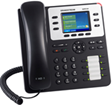
| GXP2130 |
|
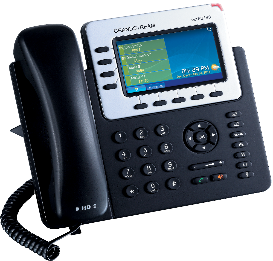 | GXP2140 | |
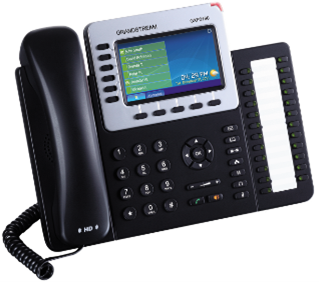 | GXP2160 |
|
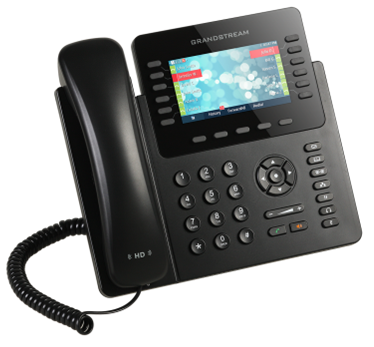 | GXP2170 |
|
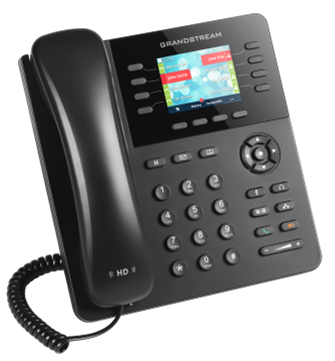 | GXP2135 |
|
| Features | GXP2130 | GXP2140 | GXP2160 | GXP2170 | GXP2135 |
|---|---|---|---|---|---|
LCD Display | 320×240 | 480 x 272 | 480 x 272 | 480 x 272 | 320×240 |
LCD Backlight | Yes | Yes | Yes | Yes | Yes |
Number of Lines | 3 | 4 | 6 | 12 | 8 |
Programmable Hard Keys | 8 | N/A | 24 | 48 | 32 |
Programmable Softkeys | 4 | 5 | 5 | 5 | 4 |
Extension Module | N/A | Yes, up to 4 EXT Boards | N/A | Yes, up to 4 EXT Boards | N/A |
GXP2130/GXP2140/GXP2160/GXP2170/GXP2135 Technical Specifications
The following table resumes all the technical specifications including the protocols / standards supported, voice codecs, telephony features, languages and upgrade/provisioning settings for the GXP21xx series.
Protocols/Standards | SIP RFC3261, TCP/IP/UDP, RTP/RTCP, HTTP/HTTPS, FTP/FTPS, ARP, ICMP, DNS (A record, SRV, NAPTR), DHCP, PPPoE, SSH, TFTP, NTP, STUN, SIMPLE, LLDP, LDAP, TR-069, 802.1x, TLS, SRTP, IPv6 |
Network Interfaces | Dual switched auto-sensing 10/100/1000 Mbps Gigabit Ethernet ports with integrated PoE |
Graphic Display | 2.8 inch (320×240) TFT color LCD |
Bluetooth | Bluetooth supported (GXP2130v2 only, GXP2130v1 does not support Bluetooth) |
Feature Keys | 3 line keys with up to 3 SIP accounts, 8 speed-dial/BLF extension keys with dual-color LED, 4 programmable contexts sensitive softkeys, 5 navigation/menu keys, 11 dedicated function keys for: MESSAGE (with LED indicator), PHONEBOOK, TRANSFER, CONFERENCE, HOLD, HEADSET, MUTE, SEND/REDIAL, SPEAKERPHONE, VOLUME+, VOLUME – |
Voice Codec | Support for G.729A/B, G.711µ/a-law, G.726, G.722 (wide-band), and in-band and out-of-band DTMF (in audio, RFC2833, SIP INFO) |
Auxiliary Ports | RJ9 headset jack (allowing EHS with Plantronics headsets) |
Telephony Features | Hold, transfer, forward, 4-way conference, call park, call pickup, shared-call-appearance (SCA), bridged-line-appearance (BLA), downloadable phonebook (XML, LDAP, up to 2000 items), call waiting, call log (up to 500 records), customization of screen, off-hook auto dial, auto answer, click-to-dial, flexible dial plan, hot desking, personalized music ringtones and music on hold, server redundancy and fail-over |
HD audio | Yes, both on handset and full-duplex handsfree speakerphone |
Base Stand | Yes, allow 2 angle positions |
Wall Mountable | Yes |
QoS | Layer 2 (808.1Q, 802.1p) and Layer 3 (ToS, DiffServ, MPLS) QoS |
Security | User and administrator level passwords, MD5 and MD5-sess based authentication, AES based secure configuration file, SRTP, TLS, 802.1x media access control |
Multi-language | LCD Language: العربية (Arabic) Català (Catalan) Czech Deutsch (German) English Español (Spanish) Français (French) עברית (Hebrew) Hrvatski (Croatian) Magyar (Hungarian) Italiano (Italian) 日本語 (Japanese) 한국어 (Korean) Latviešu valoda (Latvian) Nederlands (Dutch) Polski (Polish) Português (Portuguese) Русский (Russian) Slovenščina (Slovenian) Svenska (Swedish) Türkçe (Turkish) Ukrainian 正體中文 (Traditional Chinese) 简体中文 (Simplified Chinese) |
Upgrade/Provisioning | Firmware upgrade via TFTP/HTTP/HTTPS/FTP/FTPS, mass provisioning using TR-069 or encrypted XML configuration file |
Power & Green Energy Efficiency | Universal power adapter included: Input:100-240 VAC; Output: +12VDC, 0.5A; Integrated Power-over-Ethernet (802.3af) |
Physical | Dimension: 193mm (W) x 211mm (L) x 84.5 mm (H) Unit weight: 0.78kg Package weight: 1.3kg |
Temperature and Humidity | 32-104℉ / 0~40℃, 10-90% (non-condensing) |
Package Content | GXP2130 phone, handset with cord, base stand, universal power supply, network cable, Quick Start Guide |
Compliance | FCC Part15 Class B, EN55022 ClassB, EN61000-3-2, EN61000-3-3, EN55024, EN60950-1, AS/NZS CISPR22 Class B |
Protocols/Standards | SIP RFC3261, TCP/IP/UDP, RTP/RTCP, HTTP/HTTPS, FTP/FTPS, ARP, ICMP, DNS (A record, SRV, NAPTR), DHCP, PPPoE, SSH, TFTP, NTP, STUN, SIMPLE, LLDP, LDAP, TR-069, 802.1x, TLS, SRTP, IPv6 |
Network Interfaces | Dual switched auto-sensing 10/100/1000 Mbps Gigabit Ethernet ports with integrated PoE |
Graphic Display | 4.3 inch (480×272) TFT color LCD |
Bluetooth | Bluetooth supported |
Feature Keys | 4 line keys with up to 4 SIP accounts, 5 programmable contexts sensitive softkeys, 5 navigation/menu keys, 11 dedicated function keys for: MESSAGE (with LED indicator), PHONEBOOK, TRANSFER, CONFERENCE, HOLD, HEADSET, MUTE, SEND/REDIAL, SPEAKERPHONE, VOLUME+, VOLUME – |
Voice Codec | Support for G.723.1, G.729A/B, G.711µ/a-law, G.726, G.722 (wide-band), OPUS, iLBC and in-band and out-of-band DTMF (in audio, RFC2833, SIP INFO) |
Auxiliary Ports | RJ9 headset jack (allowing EHS with Plantronics headsets), USB, extension module port |
Telephony Features | Hold, transfer, forward, 5-way conference, call park, call pickup, shared-call-appearance (SCA)/bridged-line-appearance (BLA), downloadable phonebook (XML, LDAP, up to 2000 items), call waiting, call log (up to 500 records), customization of screen, off-hook auto dial, auto answer, click-to-dial, flexible dial plan, Hot Desking, personalized music ringtones and music on hold, server redundancy and fail-over |
HD audio | Yes, both on handset and full-duplex handsfree speakerphone |
Extension Module | Yes, can power up to 4 GXP2200EXT modules which features a 128×384 graphic LCD, 20 quick-dial/BLF keys which dual-color LED, 2 navigation keys, and less than 1.2W power consumption per unit. |
Base Stand | Yes, allow 2 angle positions |
Wall Mountable | Yes |
QoS | Layer 2 (808.1Q, 802.1p) and Layer 3 (ToS, DiffServ, MPLS) QoS |
Security | User and administrator level passwords, MD5 and MD5-sess based authentication, AES based secure configuration file, SRTP, TLS, 802.1x media access control |
Multi-language | LCD Language: العربية (Arabic) Català (Catalan) Czech Deutsch (German) English Español (Spanish) Français (French) עברית (Hebrew) Hrvatski (Croatian) Magyar (Hungarian) Italiano (Italian) 日本語 (Japanese) 한국어 (Korean) Latviešu valoda (Latvian) Nederlands (Dutch) Polski (Polish) Português (Portuguese) Русский (Russian) Slovenščina (Slovenian) Svenska (Swedish) Türkçe (Turkish) Ukrainian 正體中文 (Traditional Chinese) 简体中文 (Simplified Chinese) |
Upgrade/Provisioning | Firmware upgrade via TFTP/HTTP/HTTPS, FTP/FTPS, mass provisioning using TR-069 or encrypted XML configuration file |
Power & Green Energy Efficiency | Universal power adapter included: Input:100-240 VAC; Output: +12VDC, 1.0A; Integrated Power-over-Ethernet (802.3af). Max power consumption 6W (without GXP2200EXT), 10W (with 4 cascaded GXP2200EXTs) |
Physical | Dimension: 222mm (W) x 210mm (L) x 93mm (H); Unit weight: 0.98kg; Package weight: 1.55kg |
Temperature and Humidity | 32-104℉ / 0~40℃, 10-90% (non- condensing) |
Package Content | GXP2140 phone, handset with cord, base stand, universal power supply, network cable, Quick Start Guide |
Compliance | FCC Part15 Class B, EN55022 ClassB, EN61000-3-2, EN61000-3-3, EN55024, EN60950-1, AS/NZS CISPR22 Class B |
Protocols/Standards | SIP RFC3261, TCP/IP/UDP, RTP/RTCP, HTTP/HTTPS, FTP/FTPS, ARP, ICMP, DNS (A record, SRV, NAPTR), DHCP, PPPoE, SSH, TFTP, NTP, STUN, SIMPLE, LLDP, LDAP, TR-069, 802.1x, TLS, SRTP, IPv6 |
Network Interfaces | Dual switched auto-sensing 10/100/1000 Mbps Gigabit Ethernet ports with integrated PoE |
Graphic Display | 4.3 inch (480×272) TFT color LCD |
Bluetooth | Bluetooth supported |
Feature Keys | 6 line keys with up to 6 SIP accounts, 24 speed-dial/BLF extension keys with dual-color LED, 5 programmable contexts sensitive softkeys, 5 navigation/menu keys, 11 dedicated function keys for: MESSAGE (with LED indicator), PHONEBOOK, TRANSFER, CONFERENCE, HOLD, HEADSET, MUTE, SEND/REDIAL, SPEAKERPHONE, VOLUME+, VOLUME – |
Voice Codec | Support for G.729A/B, G.711µ/a-law, G.726, G.722 (wide-band), iLBC(pending) and in-band and out-of-band DTMF (in audio, RFC2833, SIP INFO) |
Auxiliary Ports | RJ9 headset jack (allowing EHS with Plantronics headsets), USB |
Telephony s | Hold, transfer, forward, 5-way conference, call park, call pickup, shared-call-appearance (SCA)/bridged-line-appearance (BLA), downloadable phonebook (XML, LDAP, up to 2000 items), call waiting, call log (up to 500 records), customization of screen, off-hook auto dial, auto answer, click-to-dial, flexible dial plan, Hot Desking, personalized music ringtones and music on hold, server redundancy and fail-over |
HD audio | Yes, both on handset and full-duplex handsfree speakerphone |
Base Stand | Yes, allow 2 angle positions |
Wall Mountable | Yes |
QoS | Layer 2 (808.1Q, 802.1p) and Layer 3 (ToS, DiffServ, MPLS) QoS |
Security | User and administrator level passwords, MD5 and MD5-sess based authentication, AES based secure configuration file, SRTP, TLS, 802.1x media access control |
Multi-language |
LCD Language: العربية (Arabic) Català (Catalan) Czech Deutsch (German) English Español (Spanish) Français (French) עברית (Hebrew) Hrvatski (Croatian) Magyar (Hungarian) Italiano (Italian) 日本語 (Japanese) 한국어 (Korean) Latviešu valoda (Latvian) Nederlands (Dutch) Polski (Polish) Português (Portuguese) Русский (Russian) Slovenščina (Slovenian) Svenska (Swedish) Türkçe (Turkish) Ukrainian 正體中文 (Traditional Chinese) 简体中文 (Simplified Chinese) |
Upgrade/Provisioning | Firmware upgrade via TFTP/HTTP/HTTPS/FTP/FTPS, mass provisioning using TR-069 or encrypted XML configuration file |
Power & Green Energy Efficiency | Universal power adapter included: Input:100-240V; Output: +12V, 1.0A. Integrated Power-over-Ethernet (802.3af) Max power consumption: 6W |
Physical | Dimension: 222mm (W) x 210mm (L) x 93mm (H). Unit weight: 0.98kg; Package weight: 1.62kg |
Temperature and Humidity | 32-104℉ / 0~40℃, 10-90% (non- condensing) |
Package Content | GXP2160 phone, handset with cord, base stand, universal power supply, network cable, Quick Start Guide |
Compliance | FCC Part15 Class B, EN55022 ClassB, EN61000-3-2, EN61000-3-3, EN55024, EN60950-1, AS/NZS CISPR22 Class B |
SIP RFC3261, TCP/IP/UDP, RTP/RTCP, HTTP/HTTPS, FTP/FTPS, ARP, ICMP, DNS (A record, SRV, NAPTR), DHCP, PPPoE, SSH, TFTP, NTP, STUN, SIMPLE, LLDP, LDAP, TR-069, 802.1x, TLS, SRTP, IPv6 | |
Network Interfaces | Dual switched auto-sensing 10/100/1000 Mbps Gigabit Ethernet ports with integrated PoE |
Graphic Display | 4.3 inch (480×272) TFT color LCD |
Bluetooth | Bluetooth supported |
Feature Keys | 12 line keys with up to 6 SIP accounts or 48 provisionable BLF/fast-dial keys, 5 programmable contexts sensitive softkeys, 5 navigation/menu keys, 11 dedicated function keys for: MESSAGE (with LED indicator), PHONEBOOK, TRANSFER, CONFERENCE, HOLD, HEADSET, MUTE, SEND/REDIAL, SPEAKERPHONE, VOLUME+, VOLUME – |
Voice Codec | Support for G.729A/B, G.711µ/a-law, G.726, G.722 (wide-band), in-band and out-of-band DTMF (in audio, RFC2833, SIP INFO) |
Auxiliary Ports | RJ9 headset jack (allowing EHS with Plantronics headsets), USB, extension module port |
Telephony Features | Hold, transfer, forward, 5-way conference, call park, call pickup, shared-call-appearance (SCA)/bridged-line-appearance (BLA), downloadable phonebook (XML, LDAP, up to 2000 items), call waiting, call log (up to 500 records), customization of screen, off-hook auto dial, auto answer, click-to-dial, flexible dial plan, Hot Desking, personalized music ringtones and music on hold, server redundancy and fail-over |
HD audio | Yes, both on handset and full-duplex handsfree speakerphone |
Extension Module | Yes, can power up to 4 GXP2200EXT modules which features a 128×384 graphic LCD, 20 quick-dial/BLF keys which dual-color LED, 2 navigation keys, and less than 1.2W power consumption per unit. |
Base Stand / Wall Mountable | Yes, allow 2 angle positions |
QoS | Layer 2 (808.1Q, 802.1p) and Layer 3 (ToS, DiffServ, MPLS) QoS |
Security | User and administrator level passwords, MD5 and MD5-sess based authentication, AES based secure configuration file, SRTP, TLS, 802.1x media access control |
Multi-language |
LCD Language: العربية (Arabic) Català (Catalan) Czech Deutsch (German) English Español (Spanish) Français (French) עברית (Hebrew) Hrvatski (Croatian) Magyar (Hungarian) Italiano (Italian) 日本語 (Japanese) 한국어 (Korean) Latviešu valoda (Latvian) Nederlands (Dutch) Polski (Polish) Português (Portuguese) Русский (Russian) Slovenščina (Slovenian) Svenska (Swedish) Türkçe (Turkish) Ukrainian 正體中文 (Traditional Chinese) 简体中文 (Simplified Chinese) |
Upgrade/Provisioning | Firmware upgrade via TFTP/HTTP/HTTPS/FTP/FTPS, mass provisioning using TR-069 or encrypted XML configuration file |
Power & Green Energy Efficiency | Universal power adapter included: Input:100-240V; Output: +12V, 1.0A; Integrated Power-over-Ethernet (802.3af) Max power consumption: 5.4W (without GXP2200EXT) or 9.2W (with 4 cascaded GXP2200EXTs) |
Physical | Dimension: 228mm (W) x 206mm (L) x 46.5mm (H). Unit weight: 0.98kg Package weight: 1.55kg |
Temperature and Humidity | 0 ~ 40ºC (32 ~ 104ºF) 10 ~ 90% (non-condensing) |
Package Content | GXP2170 phone, handset with cord, base stand, universal power supply, network cable, Quick Start Guide |
Compliance | FCC Part 15 (CFR 47) Class B; EN55022 Class B, EN55024, EN61000-3-2, EN61000-3-3, EN 60950-1, EN62479, AS/NZS CISPR 22 Class B, AS/NZS CISPR 24, RoHS; UL 60950 (power adapter) |
Protocols/Standards | SIP RFC3261, TCP/IP/UDP, RTP/RTCP, HTTP/HTTPS, FTP/FTPS, ARP, ICMP, DNS (A record, SRV, NAPTR), DHCP, PPPoE, SSH, TFTP, NTP, STUN, SIMPLE, LLDP, LDAP, TR-069, 802.1x, TLS, SRTP, IPv6 |
Network Interfaces | Dual switched auto-sensing 10/100/1000 Mbps Gigabit Ethernet ports with integrated PoE |
Graphic Display | 2.8 inch (320×240) TFT color LCD |
Bluetooth | Bluetooth supported |
Feature Keys | 8 line keys with up to 4 SIP accounts or 32 provisionable BLF/fast-dial keys, 4 programmable contexts sensitive softkeys, 5 navigation/menu keys, 11 dedicated function keys for: MESSAGE (with LED indicator), PHONEBOOK, TRANSFER, CONFERENCE, HOLD, HEADSET, MUTE, SEND/REDIAL, SPEAKERPHONE, VOLUME+, VOLUME – |
Voice Codec | Support for G.729A/B, G.711µ/a-law, G.726, G.722 (wide-band), in-band and out-of-band DTMF (in audio, RFC2833, SIP INFO) |
Auxiliary Ports | RJ9 headset jack (allowing EHS with Plantronics headsets) |
Telephony Features | Hold, transfer, forward, 4-way conference, call park, call pickup, shared-call-appearance (SCA)/bridged-line-appearance (BLA), downloadable phonebook (XML, LDAP, up to 2000 items), call waiting, call log (up to 500 records), customization of screen, off-hook auto dial, auto answer, click-to-dial, flexible dial plan, Hot Desking, personalized music ringtones and music on hold, server redundancy and fail-over |
HD audio | Yes, both on handset and full-duplex handsfree speakerphone |
Base Stand / Wall Mountable | Yes, allow 2 angle positions |
QoS | Layer 2 (808.1Q, 802.1p) and Layer 3 (ToS, DiffServ, MPLS) QoS |
Security | User and administrator level passwords, MD5 and MD5-sess based authentication, AES based secure configuration file, SRTP, TLS, 802.1x media access control |
Multi-language |
LCD Language: العربية (Arabic) Català (Catalan) Czech Deutsch (German) English Español (Spanish) Français (French) עברית (Hebrew) Hrvatski (Croatian) Magyar (Hungarian) Italiano (Italian) 日本語 (Japanese) 한국어 (Korean) Latviešu valoda (Latvian) Nederlands (Dutch) Polski (Polish) Português (Portuguese) Русский (Russian) Slovenščina (Slovenian) Svenska (Swedish) Türkçe (Turkish) Ukrainian 正體中文 (Traditional Chinese) 简体中文 (Simplified Chinese) |
Upgrade/Provisioning | Firmware upgrade via TFTP/HTTP/HTTPS/FTP/FTPS, mass provisioning using TR-069 or encrypted XML configuration file |
Power & Green Energy Efficiency | Universal power adapter included: Input:100-240VAC; Output: +12VDC, 0.5A; Integrated Power-over-Ethernet (802.3af) Max power consumption 3W |
Physical | Dimension: 228mm (W) x 206mm (L) x 46.5mm (H). Unit weight: 0.98kg Package weight: 1.55kg |
Temperature and Humidity | 0 ~ 40ºC (32 ~ 104ºF), 10 ~ 90% (non-condensing) |
Package Content | GXP2135 phone, handset with cord, base stand, universal power supply, network cable, Quick Start Guide |
Compliance | FCC Part 15 (CFR 47) Class B; EN55022 Class B, EN55024, EN61000-3-2, EN61000-3-3, EN 60950-1, EN62479, AS/NZS CISPR 22 Class B, AS/NZS CISPR 24, RoHS; UL 60950 (power adapter) |
INSTALLATION
Equipment Packaging
Main Case | Yes | 1 |
Handset | Yes | 1 |
Phone Cord | Yes | 1 |
Power Adaptor | Yes | 1 |
Ethernet Cable | Yes | 1 |
Phone Stand | Yes | 1 |
Wall Mount | Yes | 1 |
Quick Start Guide | Yes | 1 |
Connecting Your Phone
Handset Port | RJ9 handset connector port |
Headset Port | RJ9 headset connector port (supporting EHS with Plantronics headset) |
USB Port | USB port connecting a USB flash drive. (only on GXP2140/GXP2160/GXP2170) |
LAN Port | 10/100/1000Mbps RJ-45 port connecting to Ethernet |
PC Port | 10/100/1000Mbps RJ-45 port connecting to PC |
EXT Port | RJ11 connector port to connect the GXP2200EXT Board (only on GXP2140/GXP2170) |
Power Jack | 12V DC Power connector port |
To set up the GXP2130/GXP2140/GXP2160/GXP2170/GXP2135, follow the steps below:
- Attach the phone stand or wall mount to the back of the phone where there are slots.
- Connect the handset and main phone case with the phone cord.
- Connect the LAN port of the phone to the RJ45 socket of a hub/switch or a router (LAN side of the router) using the Ethernet cable.
- Connect the 12V DC output plug to the power jack on the phone and plug the power adapter into an electrical outlet. If PoE switch is used in step 3, this step could be skipped.
- The LCD will display provisioning or firmware upgrade information. Before continuing, please wait for the date/time display to show up.
- Using the keypad configuration menu or phone’s embedded web server (Web GUI) by entering the IP address in web browser, you can further configure the phone.
GXP2200EXT Module
The GXP2140/GXP2170 is expandable with GXP2200EXT modules. GXP2140/GXP2170 supports up to 4 extension modules, adding 160 fully programmable phone extensions to the phone.
GXP2200EXT board package contains:
GXP2200EXT Main Case | Yes (1) |
GXP2200EXT Stand | Yes (1) |
RJ11-RJ11 Cable | Yes (1) |
Connector Plate | Yes (1) |
Screws | Yes (4) |
Quick Installation Guide | Yes (1) |
To set up the GXP2200EXT board with the GXP2140/GXP2170, please follow the steps below:
- On the back of the GXP2140/GXP2170 and the GXP2200EXT, there are slots for connector plate. Attach the connector plate between the slots for GXP2140/GXP2170 and the GXP2200EXT;
- Apply the screws provided and securely tighten them in (See Figure 1: GXP2140/GXP2170 Back View with GXP2200EXT ).
- Connect the GXP2200EXT board to the GXP2140/GXP2170 via EXT port using the RJ11-RJ11 cable provided;
- Install the phone stand on the GXP2140/GXP2170 and the GXP2200EXT board;
- Power up the GXP2140/GXP2170. The GXP2200EXT board will show the booting up screen with version information and connecting status;
- After successfully booting up, the GXP2200EXT board will stay in idle. Press and hold the Left button for 3 to 5 seconds to check the version information and status.
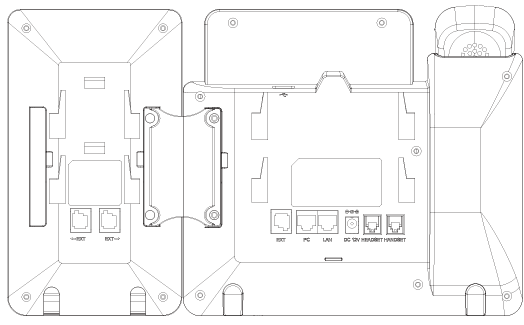
The GXP2200EXT board can be configured via the web GUI of the GXP2140/GXP2170 connected. After successfully configured, press Left or Right button on the GXP2200EXT board and users could browse all the MPK’s status in different pages.
For more information on installing, connecting and configuring the GXP2200EXT board with GXP2140/GXP2170, please refer to the GXP2200EXT board user manual: https://www.grandstream.com/support
GETTING STARTED
Idle Screen
GXP2130/GXP2140/GXP2160/GXP2170/GXP2135 screen displays differently depending on whether the phone is idle or in use (active). The following figures show the idle screen of GXP2130 / GXP2140 / GXP2160 / GXP2170 / GXP2135.
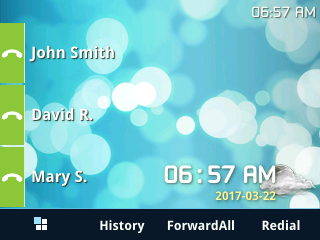


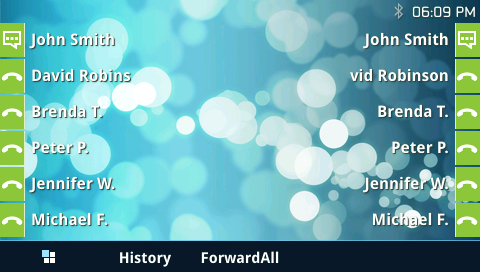
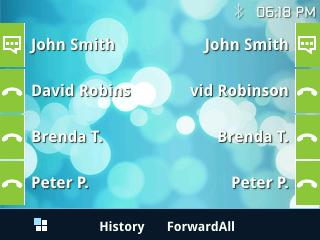
The following table describes the items displayed on GXP2130/GXP2140/GXP2160/GXP2170/GXP2135 idle screen.
Displays the current date and time. It can be synchronized with Internet time servers. Note: For GXP2135 and GXP2170, if there’s no VPK configured with the first VPK on the right side of the LCD screen, users can display time and date on the top of the LCD screen (status bar) by enabling the option “Show Date On Status Bar” under Web GUI🡪Settings🡪Date and Time. Note: Under Settings => Preferences => Date& Time in Web UI configuration, you can enable the option to show the clock widget on LCD | |
Network icon | Shows the status of network. It will indicate whether the network is down or starting. |
Status icon | Shows the status of the phone for registration status, call features etc. Using icons as shown in the next table. |
Line status indicator | Displays the name of the account that is in use. |
Softkeys in idle screen | The softkeys are context sensitive and will change depending on the status of the phone. Typical functions assigned to softkeys are:
Toggles between different idle screens. For example, for GXP2130/GXP2140/GXP2160/GXP2170/GXP2135, pressing most left softkey (switch screen) will toggle among default idle screen, and Grandstream Upcoming Events;
Shows up all the call history, including “All”, “Answered Calls”, “Dialed Calls”, “Missed Calls”, and “Transferred Calls”.
Unconditionally forwards the phone line (account 1) to another phone.
Redials the last dialed number when there is existed dialed call log. |
Softkeys in call screen | The softkeys are context sensitive and will change depending on the call status of the phone. Here are the main softkeys in call screen.
Redials the last dialed number after off hook when there is existed call log.
Dials the call out after off hook and entering the number.
Delete the number before dialing out.
Answers the incoming call when the phone is ringing.
Rejects the incoming call when the phone is ringing.
Forward the incoming call when the phone is ringing.
Ends the active call.
Transfer softkey will show up after pressing TRAN button and entering transfer target number. Press Transfer softkey to do blind transfer.
In attended transfer mode, after establishing the second call, press Split to quit transfer and go back to normal talking status.
Conferences the active calls.
Re-establish the conference among the calls on hold. |
Special Softkeys (only when device integrated with UCM6xxx) | Call Parking: Please refer to UCM6xxx Online User Manual for more information
When the phone dials out, the Call Park softkey will display on screen. To park the call, press the “CallPark” softkey and select a green MPK to park the call on available parking lot. Features: On UCM, users need to enable “Keep-alive” option for the registered account.
When enabled, Do Not Disturb, Call Forwarding and other call features can be used via the local feature codes on the phone. Otherwise, the provisioned feature codes from the server will be used. User configured feature codes will be used only if server provisioned feature codes are not provided. And once feature codes are configured, either via server provisioning or local setting, a softkey named “Features” will show on the LCD screen. |
| Network Status. OFF – Network connection is up ON – Network connection is down | |
| DND Status. OFF – Do Not Disturb disabled ON – Do Not Disturb enabled | |
| Call Forward All Status. OFF – Call Forward All feature disabled ON – Call Forward All feature enabled | |
| Call Forward Busy Status. OFF – Call Forward Busy feature disabled ON – Call Forward Busy feature enabled | |
| Call Forward No Answer Status. OFF – Call Forward No Answer feature disabled ON – Call Forward No Answer feature enabled | |
| Missed Call Status. OFF – No missed call ON – New missed call | |
| Handset Status. OFF – Handset is not in use ON – Handset is in use | |
| Headset Status. OFF – Headset is not in use ON – Headset is in use | |
| Microphone MUTE Status. OFF – No muted ON – Muted | |
| Bluetooth Status. (GXP2130v2/GX2140/GXP2160/GXP2170/GXP2135) OFF – Bluetooth icon disappears ON – Bluetooth icon appears Paired – Bluetooth icon turns bright | |
| USB Status. (GX2140/GXP2160/GXP2170) OFF – No USB connection ON - USB connected | |
| Incoming Call. The current call is an incoming call | |
| Outgoing Call. The current call is an outgoing call | |
| Call on Hold. OFF – No call on hold ON – Call on hold | |
| Call Connect. OFF – No call ON – Call connected | |
| Call Conference. OFF – No Conference call ON – Conference call is established | |
| Click Hand In call screen, this icon shows on the line available for transfer or conference. | |
| IP Call Status The current call is an IP call. | |
| SIP Call Enter number for initiate call. The current call is a SIP call. | |
| Call Time During an active call, this icon shows the call time. | |
| LCD Brightness Up Brightness is increasing | |
| LCD Brightness Down Brightness is decreasing | |
| Speaker Volume Up Call screen icon. Speaker volume is increasing | |
| Speaker Volume Down Call screen icon. Speaker volume is decreasing | |
| Handset Volume Up Call screen icon. Handset volume is increasing | |
| Handset Volume Down Call screen icon. Handset volume is decreasing | |
| Ringtone Volume Down Call screen icon. The volume of ringtone is decreasing | |
| Ringtone Volume Up Call screen icon. The volume of ringtone is increasing | |
| VOC status Call screen icon. OFF – VOC is off. ON – VOC is on. | |
| Job Title and/or Company Name Displays the Job title and company name of the caller |
Error Message Indicator
When user changes configuration settings on LCD and the configuration cannot be applied for any reason, LCD screen will pop up a window displaying an error message with information explaining why the configuration couldn’t be saved.
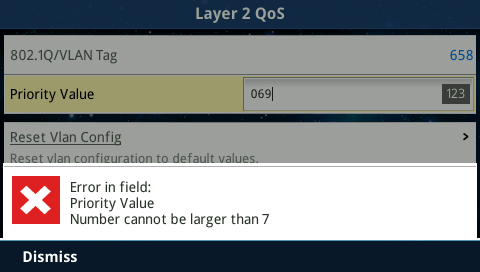
Note: Possible error types could be Security, Privilege, PValue Validation, etc
Using the Keypad
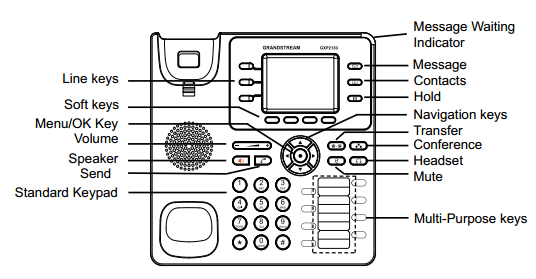
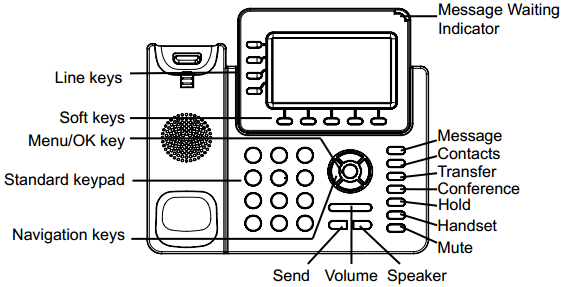
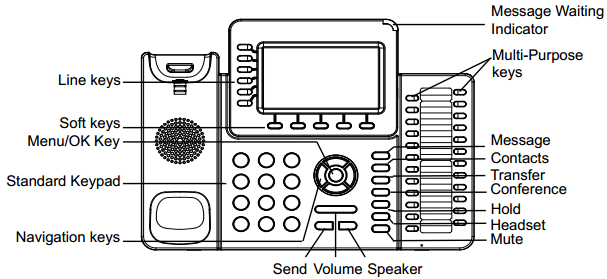


Contacts. Press to view and edit contact information. | |
Hold. Press to put call on hold or resume the call. | |
Mute. Press to mute or unmute the call. | |
Headset. Press to switch to headset mode. | |
Message. Press to view voicemail messages. | |
Transfer. Press to transfer call. | |
Conference. Press to conference call. | |
Speaker. | |
Send/Redial. | |
Volume. | |
Up Navigation key. In idle screen, press to see the IP. |
Configuration via Keypad
To configure the LCD menu using phone’s keypad, follow the instructions below:
- Enter MENU options. When the phone is in idle, press the round MENU button to enter the configuration menu.
- Navigate in the menu options. Press the arrow keys up/down/left/right to navigate in the menu options.
- Enter/Confirm selection. Press the round MENU button or “Select” Softkey to enter the selected option.
- Exit. Press “Exit” Softkey to exit to the previous menu.
- Return to Home page.
In the Main menu, press Home Softkey to return home screen.
In sub menu, press and hold “Exit” Softkey until Exit Softkey changes to Home Softkey, then release the Softkey.
- The phone automatically exits MENU mode with an incoming call, when the phone is off hook or the MENU mode if left idle for more than 60 seconds.
- When the phone is in idle, pressing the UP-navigation key can see phone’s IP address, IP setting, MAC address and software address.
The MENU options are listed in the following table.
The following picture shows the keypad MENU configuration flow:
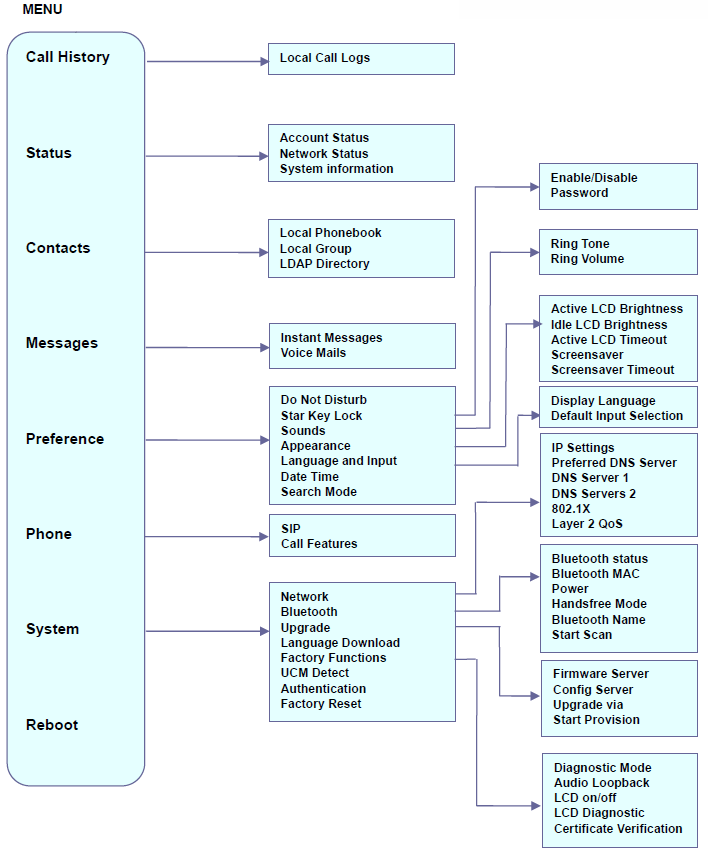
Configuration via Web Browser
The GXP2130/GXP2140/GXP2160/GXP2170/GXP2135 embedded Web server responds to HTTP/HTTPS GET/POST requests. Embedded HTML pages allow a user to configure the IP phone through a Web browser such as Google Chrome, Mozilla Firefox and Microsoft’s IE.
To access the Web GUI:
- Connect the computer to the same network as the phone.
- Make sure the phone is turned on and shows its IP address. You may check the IP address by pressing Up arrow button when phone is at idle state.
- Open a Web browser on your computer.
- Enter the phone’s IP address in the address bar of the browser.
- Enter the administrator’s login and password to access the Web Configuration Menu.
Notes:
- The computer must be connected to the same sub-network as the phone. This can be easily done by connecting the computer to the same hub or switch as the phone connected to. In absence of a hub/switch (or free ports on the hub/switch), please connect the computer directly to the PC port on the back of the phone;
- If the phone is properly connected to a working Internet connection, the IP address of the phone will display in MENU🡪Status🡪Network Status. This address has the format: xxx.xxx.xxx.xxx, where xxx stands for a number from 0-255. Users will need this number to access the Web GUI. For example, if the phone has IP address 192.168.40.154, please enter “http://192.168.40.154” in the address bar of the browser;
- There are two access levels for the login page:
User Level | User | Password | Web Pages Allowed |
End User Level | user | Set by admin | Only Status and Basic Settings |
Administrator Level | admin | admin | Browse all pages |
- When accessing the GXP2130/2140/2160/2170/2135 for the first time or after factory reset, users will be asked to change the default administrator password before accessing GXP21xx Web interface.
- The new password field is case sensitive with a maximum length of 25 characters. Using strong password including letters, digits and special characters is recommended for better security.
- Since end user level access is disabled by default, administrators will have to enable user web access under Maintenance 🡪 Web Access, and set a new user password on the same page to enable users to access the Web UI.
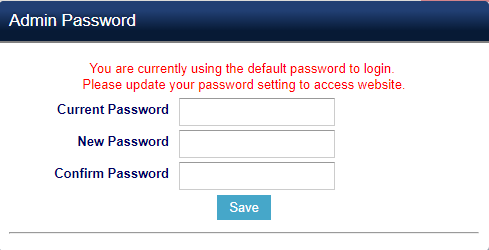
- When changing any settings, always SUBMIT them by pressing the “Save” or “Save and Apply” button on the bottom of the page. If the change is saved only but not applied, after making all the changes, click on the “APPLY” button on top of the page to submit. After submitting the changes in all the Web GUI pages, reboot the phone to have the changes take effect if necessary (All the options under “Accounts” page and “Phonebook” page do not require reboot. Most of the options under “Settings” page do not require reboot).
Characters Input
The GXP21xx keypad can be used by tapping on an input field. GXP21xx keypad has 4 modes “123”, “ABC”, “abc” and “1Bc”. Default mode is “1Bc”. Note: If the input field is accepting only digits, only “123” mode will be available.
- “123” Mode: This mode allows to enter digits and . only.
- “ABC” Mode: This mode allows to enter capital letters, digits and symbolic characters.
- “abc” Mode: This mode allows to enter small letters, digits and symbolic characters.
- “1Bc” Mode: This mode allows to enter capital letters, small letters, digits and symbolic characters.
Following table describes allowed characters for each key.
| Key | Description | Key | Description | Key | Description |
|---|---|---|---|---|---|
1 | 1 Space . : / ‘ ` @ * + – = , | & ? ! % ( ) ~ _ < > { } [ ] ^ | 2 | 2 A B C a b c | 3 | 3 D E F d e f |
4 | 4 G H I g h i | 5 | 5 J K L j k l | 6 | 6 M N O m n o |
7 | 7 P Q R S p q r s | 8 | 8 T U V t u v | 9 | 9 W X Y Z w x y z |
* | * | 0 | 0 | # | # |
Making Phone Calls
Handset, Speaker and Headset Mode
The GXP2130/GXP2140/GXP2160/GXP2170/GXP2135 allows users to switch among handset, speaker or headset when making calls. Press the Hook Switch to switch to handset; press the Headset button to switch to headset; or press the Speaker button to switch to speaker.
Multiple SIP Accounts and Lines
GXP2160/GXP2170 can support up to 6 independent SIP accounts; GXP2140 can support up to 4 independent SIP accounts; GXP2130 can support up to 3 independent SIP accounts. Each account is capable of independent SIP server, user and NAT settings. Each of the line buttons is “virtually” mapped to an individual SIP account. In off hook state, select an idle line and the dial tone will be heard.
To make a call, select the line you wish to use. The corresponding LINE LED will light up in green. The user can switch lines before dialing any number by pressing the LINE buttons.
For example: If 2 independent accounts are registered on GXP2130 / GXP2140 / GXP2160 / GXP2170/GXP2135, when LINE 1 is pressed, the LINE 1 LED will light up in green. If LINE 2 is pressed, the LINE 2 LED will light up in green and the subsequent call will be made through SIP account 2.
Incoming calls to a specific account will attempt to use its corresponding LINE if it is not in use. When the “virtually” mapped line is in use, the phone will flash the other available LINE in red. A line is ACTIVE when it is in use and the corresponding LED is red.
Completing Calls
There are several ways to complete a call.
- On hook dialing. Enter the number when the phone is on hook and then send out.
- When the phone is in idle, enter the number to be dialed out;
- Take handset off hook, or Press Speaker button, or Press Headset button with headset plugged in, or Select an available LINE key.
- The call will be dialed out.
- Off hook and dial. Off hook the phone, enter the number and send out.
- Take handset off hook; or
- Press Speaker button; or
- Press Headset button with headset plugged in; or
- Press an available LINE key to activate speaker;
- You shall hear dial tone after off hook;
- Enter the number;
- Press SEND, * or # keys to dial out.
- Predictive dialing. When dialing numbers, based on the entered digit or digits, the phone will predict and list the candidates of target number.
If the target number already saved in phonebook, when enter the first several digits, phone will display a list of the matched numbers. If the target number appears on the list, user could select the number by Up/Down key and dial out. GXP2130/GXP2140/GXP2160/GXP2170/GXP2135 has predefined call feature code (the first digit is *). When user enter * as the first digit of target number, the phone will list all feature codes as candidates.
- Redial. Redial the last dialed number.
- Take handset off hook; or
- Press Speaker button; or
- Press Headset button with headset plugged in; or
- Press an available LINE key to activate speaker; or
- When the phone is in idle; Press SEND key, or the REDIAL softkey.
- Via Call History. Dial the number logged in phone’s call history.
- Press MENU button to bring up the main menu;
- Enter Call History;
- Select the entry you would like to call using the navigation arrow keys;
- Press SEND button to dial out.
- Via Phonebook. Dial the number from the phonebook.
- Press Contacts button;
- Under Contacts, enter Local Phonebook/ Broadsoft Phonebook using the navigation arrow key;
- Select the contact you would like to call using the navigation arrow key;
Note: Users can press on “Edit / Dial” to edit the phone number and choose one account to dial that number.
- Press SEND button to dial the selected contact.
- Speed Dial from Line Key. Dial the number configured as Speed Dial on Line Key.
- Go to phone’s Web GUI🡪Settings🡪Programmable Keys, configure the Line Key’s Key Mode as Speed Dial. Select the account to dial from, enter the Name and User ID (the number to be dialed out) for the Line Key. Click on “Update” at the bottom of the Web GUI page;
- Off hook the phone, or directly press the Speed Dial key to dial out.
- Call Return. Dial the last answered call.
- Go to phone’s Web GUI🡪Settings🡪Programmable Keys, configure the Line Key’s Key Mode as Call Return. Select the account to dial from, no Name or User ID must be set on for Call Return;
- Off hook the phone, or directly press the Call Return key to dial out.
- Via Paging/Intercom.
- Take handset off hook; or
- Press Speaker button; or
- Press Headset button with headset plugged in
- or Press an available LINE key to activate speaker;
- You shall hear dial tone after off hook;
- Press MENU button to switch the call screen from “Dialing” to “Paging”;
- Enter the number;
- Press SEND, * or # keys to dial out.
Notes:
- After entering the number, the phone waits for the No Key Entry Timeout (Default timeout is 4 seconds, configurable via Web GUI) before dialing out. Press SEND or # key to override the No Key Entry Timeout;
- If digits have been entered after handset is off hook, the SEND key will works as SEND instead of REDIAL;
- By default, # can be used as SEND to dial the number out. Users could disable it by setting “User # as Dial Key” to “No” from Web GUI🡪Account X🡪Call Settings.
- For Paging/Intercom, if the SIP Server/PBX supports the feature and has Paging/Intercom feature code set up already, users do not necessarily need toggle to paging mode in the call screen. Simply dial the feature code with extension as a normal call.
- When dial out via paging, user can see the “call-info” header contains “answer-after=0” and “the “alert-info” header contains “info=alert-autoanswer;delay=0” in the outgoing INVITE.
-
During an active call, user can see call info on LCD:
shows the call lasting time;
shows contact information if the number is already saved in phonebook. When dialing DTMF, user can press round OK button to switch to call info page.
- It is possible to mute the call at dialing stage by composing a number , dialing the call and pressing the mute button before the call is answered.
Making Calls Using IP Addresses
Direct IP Call allows two phones to talk to each other in an ad-hoc fashion without a SIP proxy. VoIP calls can be made between two phones if:
- Both phones have public IP addresses; or
- Both phones are on the same LAN/VPN using private or public IP addresses; or
- Both phones can be connected through a router using public or private IP addresses (with necessary port forwarding or DMZ).
To make a direct IP call, please follow the steps below:
- When phone is at idle state, press any number key or * key to bring up “Onhook Dialing” page;
- Press round menu key or “DirectIP” softkey;
- Input the target IP address (Please see example below);
- Press “OK” softkey to dial.
For example:
If the target IP address is 192.168.1.60 and the port is 5062 (i.e., 192.168.1.60:5062), input the following: 192*168*1*60#5062. The * key represents the dot (.), the # key represents colon (:). Wait for about 4 seconds and the phone will initiate the call.
Quick IP Call Mode:
The GXP2130/GXP2140/GXP2160/GXP2170/GXP2135 also supports Quick IP Call mode. This enables the phone to make direct IP calls using only the last few digits (last octet) of the target phone’s IP address. This is possible only if both phones are under the same LAN/VPN. This simulates a PBX function using the CSMA/CD without a SIP server. Controlled static IP usage is recommended.
To enable Quick IP Call Mode, go to phone’s Web GUI🡪Settings🡪Call Features, set “Use Quick IP Call Mode” to “Yes”. Clicking on “Save and Apply” on the bottom of Web GUI page to take the change. To make Quick IP Call, take the phone off hook first. Then dial #xxx where x is 0-9 and xxx<255. Press # or SEND and a direct IP call to aaa.bbb.ccc.XXX will be completed. “aaa.bbb.ccc” is from the local IP address regardless of subnet mask. The number #xx or #x are also valid. The leading 0 is not required (but it’s OK).
For example:
- 192.168.0.2 calling 192.168.0.3 — dial #3 followed by # or “SEND”;
- 192.168.0.2 calling 192.168.0.23 — dial #23 followed by # “SEND”;
- 192.168.0.2 calling 192.168.0.123 — dial #123 followed by # “SEND”;
- 192.168.0.2: dial #3 and #03 and #003 results in the same call — call 192.168.0.3.
Note:
- The # will represent colon “:” in direct IP call rather than SEND key as in normal phone call;
- If you have a SIP server, configured, direct IP call still works. If you are using STUN, direct IP call will also use STUN;
- Configure the “User Random Port” to “No” when completing direct IP calls.
Virtual Multi-Purpose Keys
Web UI Configuration
Users can find new Virtual Multi-Purpose Keys (VPK) configuration under phone’s web UI🡪Settings🡪Programmable Keys🡪Virtual Multi-Purpose Keys tab. It is recommended to select “Reset” on this page before configuring VPK here. By default, all fixed VPKs are listed.
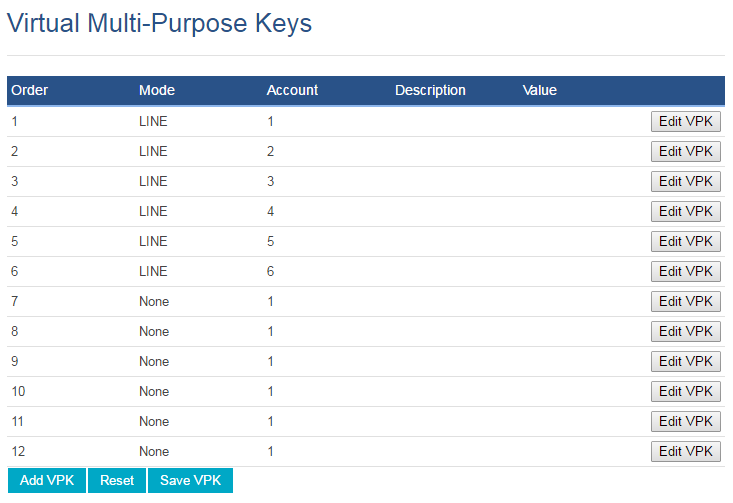
Click on “Edit VPK” for the line (fixed VPK) you would like to configure. A new window will pop up for VPK configuration. Users can configure Mode, Account, Description and Value for the VPK. Up to 30 mode options can be selected for the VPK. Once done, press “Save” on this window and press “Save VPK” on the bottom of the Virtual Multi-Purpose Keys page again to apply the change.
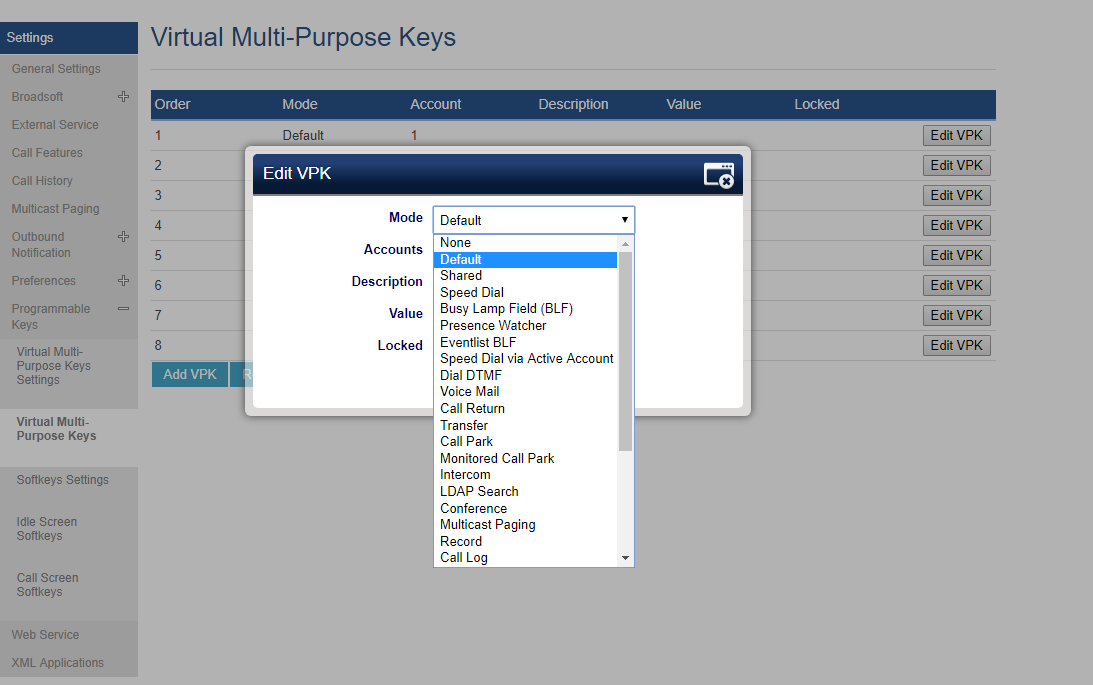
If users would like to configure more VPKs than the ones displayed on the page, the users can click on “Add VPK” to configure dynamic VPK. The dynamic VPK supports up to 27 mode options.

Please note:
- Dynamic VPK does not support LINE and Shared LINE mode. These two mode options are only available for fixed VPKs.
- Dynamic VPK does not support NONE mode. If users do not need this VPK, click on “Edit VPK” for it and select “Delete” to remove this VPK.
- All settings require user to click on “Save” on the prompted window and “Save VPK” button on the bottom of Virtual Multi-Purpose Keys page to take effect.
P-Value for VPK Mode in String Format
| Model Name | Mode String | Mode P-Value |
|---|---|---|
None | None | -1 |
Default | line | 0 |
Shared Line | shared line | 1 |
Speed Dial | speed dial | 10 |
Busy Lamp Field | blf | 11 |
Presence Watcher | presencewatcher | 12 |
Eventlist BLF | eventlistblf | 13 |
Speed Dial via Active Account | speeddialaa | 14 |
Dial DTMF | dialdtmf | 15 |
Voice Mail | voicemail | 16 |
Call Return | callreturn | 17 |
Transfer | transfer | 18 |
Call Park | callpark | 19 |
Intercom | intercom | 20 |
LDAP search | ldapsearch | 21 |
Conference | conference | 22 |
Multicast Paging | multicastpaging | 23 |
Record | record | 24 |
Call Log | calllog | 25 |
Monitored Call Park | monitoredcp | 26 |
Menu | menu | 27 |
XML Application | xmlapp | 28 |
Information | information | 29 |
Message | message | 30 |
Forward | forward | 31 |
Do Not Disturb | dnd | 32 |
Redial | redial | 33 |
Instant message | instantmessage | 34 |
Multicast listen address | multicastlistenaddress | 35 |
Keypad Lock | keypadlock | 36 |
The string could be capital or lower-case letters, but there must be no “space” in between. For example, in the cfg.xml, “Transfer” or “transfer” is the same as “18”, it will configure Virtual Multi-Purpose Key 3 as transfer mode.
Note: The string format is supported for MPK, extension board and softkey as well.

LCD Indication and Configuration
The configured fixed VPKs are displayed next to the corresponding line. If dynamic VPKs are configured, the users can see a page number shown on the upper left corner on the LCD.
The following figures show page 1 and page 2 of the VPKs on LCD. Pressing “RIGHT” arrow key or “Next” softkey will switch to the next page; pressing “LEFT” arrow key will switch back to the previous page.
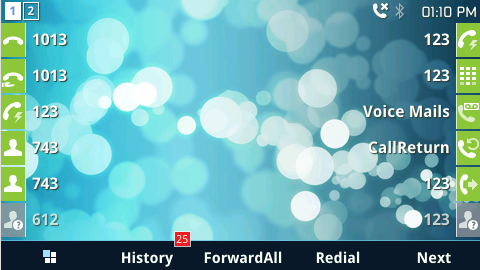
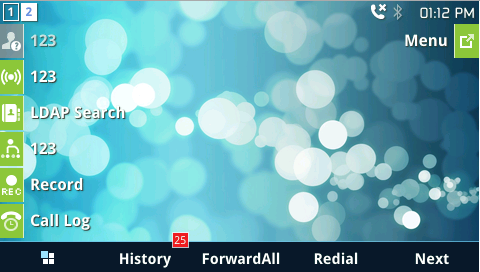
The users could also edit and add VPK from LCD.
- To edit (fixed) VPK, press and hold the line key for about 4 seconds, a configuration window will pop up for the user to configure.
- To add (dynamic) VPK, press and hold the RIGHT arrow key for about 4 seconds, a configuration window will pop up for the user to configure.
Up to 20 modes can be supported on fixed VPK and up to 17 modes can be supported on dynamic VPK. Each mode is indicated by a different icon on the LCD and the icon will be different when in different status.
Please find the icon indications below for different mode of VPK.
| VPK Mode | State | Icon | LED Status |
|---|---|---|---|
LINE |
Unregistered
|
| OFF |
Registered + Idle
|
| OFF | |
Unregistered + IM + Voice mail |
| OFF | |
Registered + IM + Voice mail |
| OFF | |
Unregistered + IM (No Voice mail) |
| OFF | |
Registered + IM (No Voice mail) |
| OFF | |
Unregistered + Voice Mail (No IM) |
| OFF | |
Registered + Voice Mail (No IM) |
| OFF | |
Unregistered + Call Forward All
|
| OFF | |
Registered + Call Forward All
|
| OFF | |
Unregistered + Call Forward Delay + Call Forward Busy
|
| OFF | |
Registered + Call Forward Delay + Call Forward Busy
|
| OFF | |
Unregistered + Call Forward Delay
|
| OFF | |
Registered + Call Forward Delay
|
| OFF | |
Unregistered + Call Forward Busy
|
| OFF | |
Registered + Call Forward Busy
|
| OFF | |
Registered + Ringing |
| Flashing RED | |
Registered + On Hold |
| Flashing GREEN | |
Registered + Connected + Incoming Call |
| GREEN | |
Registered + Connected + Outgoing Call |
| GREEN | |
Shared Line | Unregistered |
| OFF |
Registered + Not support SCA Call-info header |
| OFF | |
Registered + Not support SCA or SCA Failed |
| OFF | |
Registered + Idle |
| OFF | |
Registered + Seized |
| RED(Alternate DUT) | |
Registered + Processing |
| Flashing GREEN(Alternate DUT) | |
Registered + Alert |
| Flashing RED | |
Registered + Hold by user |
| Flashing GREEN | |
Registered + Hold by the other party |
| Flashing RED | |
Registered + Connected |
| GREEN | |
BLF/ | Offline, Unknown |
| OFF |
Terminated |
| GREEN | |
Proceeding |
| RED | |
Ringing (Early) |
| Flashing RED | |
Trying |
| Flashing GREEN | |
Confirmed |
| RED | |
Presence Watcher | Offline, Unknown |
| OFF |
Available |
| GREEN | |
Handsfree | Unpair |
| OFF |
Paired, but not connected |
| OFF | |
Connected |
| OFF | |
Speed Dial | Account Unregistered |
| OFF |
Account Registered |
| OFF | |
Speed Dial Via Active Account |
|
| OFF |
Dial DTMF |
|
| OFF |
Call Return |
|
| OFF |
Transfer | Account Unregistered |
| OFF |
Account Registered |
| OFF | |
Call Park | Account Unregistered |
| OFF |
Account Registered |
| OFF | |
Intercom | Account Unregistered |
| OFF |
Account Registered |
| OFF | |
LDAP Search |
|
| OFF |
Multicast Paging |
|
| OFF |
Record | Idle |
| OFF |
Recording |
| Flashing | |
Call Log |
|
| OFF |
Menu |
| OFF | |
Voice Mail | Account not registered |
| OFF |
Account Registered
|
| OFF | |
Account Registered
|
| OFF |
Please note that no matter how each line is configured on the idle screen, all the lines in call screen will keep line or shared line displayed for the corresponding accounts. For example, even if the user has configured all lines as VPK (with non-LINE mode), he/she can still use the configured account to dial out by Offhook or pressing SPEAKER, HEADSET or any other unconfigured LINE key to go to call screen.
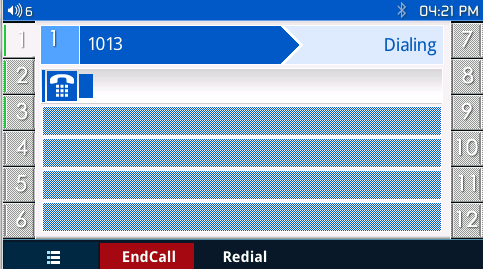
When user is in call screen (during a call), he/she can press softkey
to switch back to VPK screen.
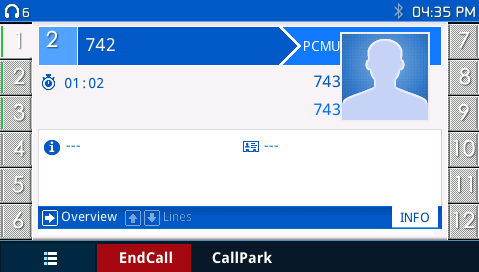
When the user is in VPK screen during a call, he/she can press softkey
or corresponding line key to switch back to call screen.
Notes :
- If a call is parked via VPK call park, the display on the VPK will change between CID of the active call and the parking number.
- When changing the VPK information that requires subscription, the phone will perform unsubscribe first, then perform a new subscription. This way server will know that previous subscription has been void.
Predictive Dialing from Call History
Functionality
Phone search in call history entries, and if the entered digits match some call history entries, list of entries should be displayed with corresponding names.
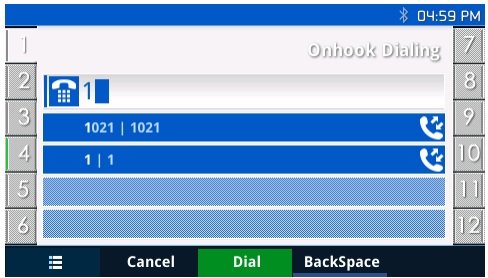
Predictive Dialing Search including Broadsoft Directories
Web configuration
Users can configure Broadsoft XSI directories correctly from Web GUI under Settings 🡪 Broadsoft 🡪 Broadsoft Directories.
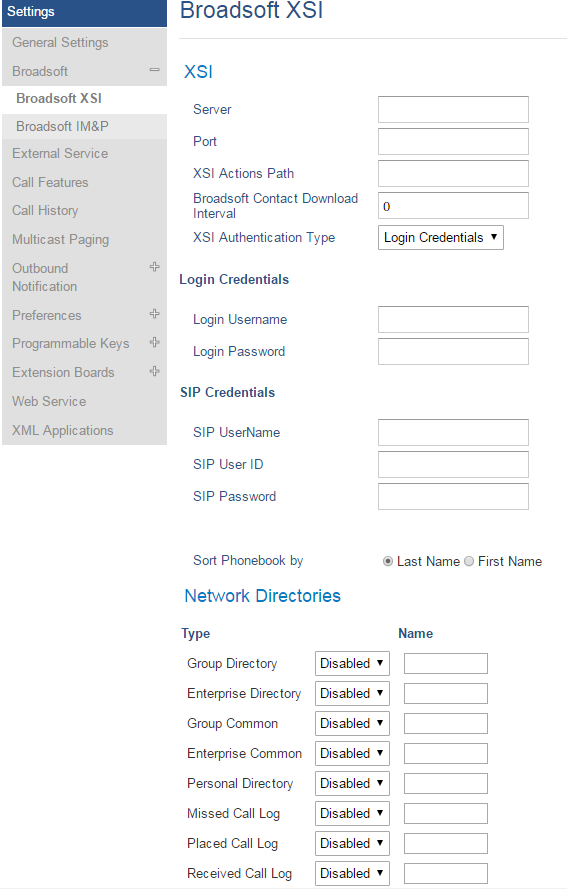
Functionality
Phone can predict possible contacts information from Broadsoft XSI directories when users dials a number. Users can select the predictive dialing number to dial out even complete number is not typed. Predictive numbers will be shown if Broadsoft XSI directory information is loaded after pressing the related number.

Multiple Numbers and Other Info for One Contact in Phonebook
Functionality
User can add Phone type in phonebook.xml to add other phone type besides existing “Work”,”Home” and “Cell”. Here is an example for the phonebook.xml:
<AddressBook>
<Contact>
<id>1</id>
<FirstName>abc</FirstName>
<LastName>def</LastName>
<JobTitle>jobtitle</JobTitle>
<Frequent>0</Frequent>
<Phone type="type">
<phonenumber>4444</phonenumber>
<accountindex>0</accountindex>
</Phone>
<Phone type="type">
<phonenumber>5555</phonenumber>
<accountindex>0</accountindex>
</Phone>
<Phone type="Work">
<phonenumber>1111</phonenumber>
<accountindex>0</accountindex>
</Phone>
<Phone type="Home">
<phonenumber>2222</phonenumber>
<accountindex>0</accountindex>
</Phone>
<Phone type="Cell">
<phonenumber>3333</phonenumber>
<accountindex>0</accountindex>
</Phone>
<Primary>1</Primary>
<Department>department</Department>
<Job>job</Job>
<Title>title</Title>
<Company>company</Company>
</Contact>
</AddressBook>
On the display of the contact on LCD of the phone will shows as follows:
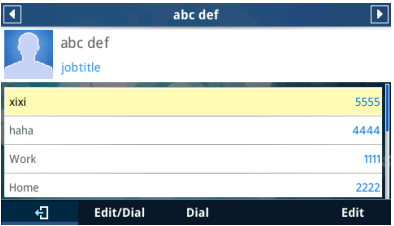
User can also input the “Company” “Title” “Job” filed through the phonebook.xml in the previous example or on the LCD of the phone like following example:
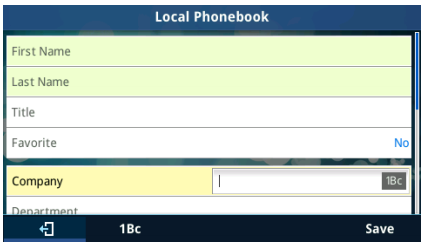
Search a String using Quick Search
The quick search feature allows users to be able to search parts and strings of the entries and get the search result from it. For instance, if users only remember the first name, last name or parts of the name / phone number, they can use the string in the search bar as displayed on the following screenshots:
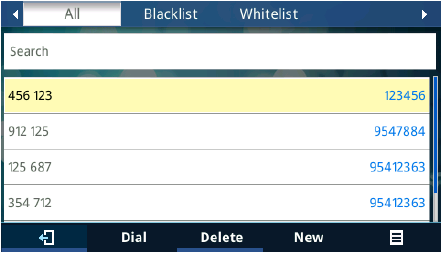
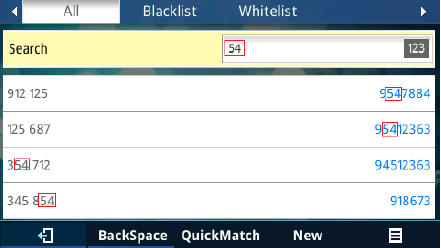
Search a String with Exact Matching mode
Now the users can search their contacts using alphabets in the exact mode which allows them to find their contacts even if they forget the numbers. To perform this type of search, make sure that search type is set to Exact as shown on the following figure, then you can enter the exact name of the contact for lookup.
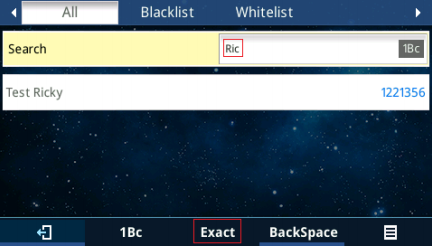
Exact Match Search in LDAP
Functionality
With LDAP Lookup Incoming call, outgoing call selected, the phone will perform LDAP search during incoming and outgoing call. If exact match search enabled, during the LDAP search, the phone will only get the result that matches the search input exactly. i.e. if 100 is the incoming/outgoing number only 100 will get searched, *100* will not. This option can be found under device web UI 🡪 Phonebook 🡪 LDAP. For further information, please refer to the admin guide.
Search in Broadsoft Directories
Functionality
User can search from the Broadsoft directories when the user input the search content in the search form.

The matching list will show as follows:
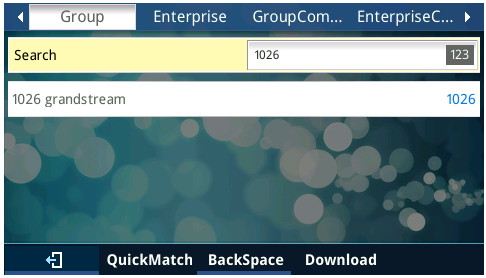
Note: If the “XSI Authentication” Type is set to “Login Credentials” and the credentials are left empty or the login failed, the phone will show the login window when users try to make a search on BroadSoft Phonebook.

Sort Broadsoft Phonebook by Last/First Name
Users can either search in Broadsoft phonebook by first / last name, phone number or extension number.
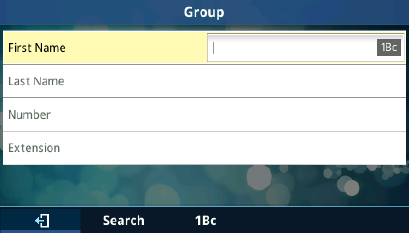
Note: Users can select the sorting style when performing search on LCD. This option can be found under device web UI 🡪 Phonebook 🡪 Phonebook Management.
Filter Characters from Dialed Numbers
After downloading phonebook, when dialing a number from the contacts, the number may include special characters such as “,”, “- “, or space in between numbers.
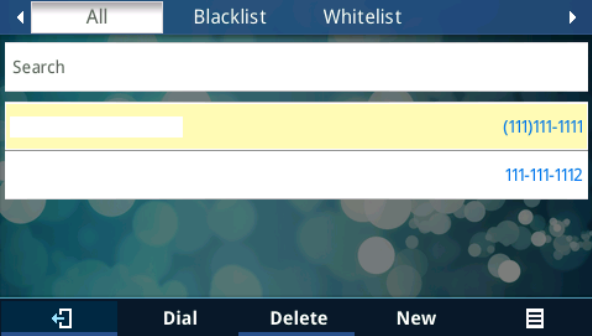
When pressing Dial softkey directly, the phone will filter out the special characters and make the calls send out properly.
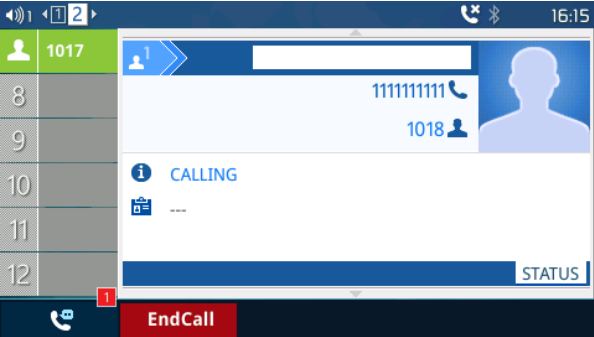
Show/Hide Label Support
Labels shown on the side of the LCD screen take space and in some cases narrow information displayed on the screen, using the “Show/Hide Label” users can hide the entire label to free up more space on the screen to see more display of either phone numbers or names.
The result should look like the following:
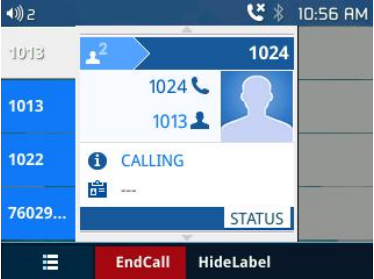
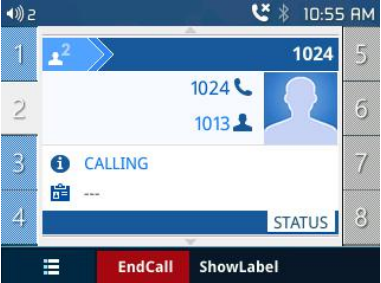
Predictive Dialing
This feature allows users to enable/disable predictive dialing, when it is disabled, user will not see and predictive number while dialing as shown in figures below.
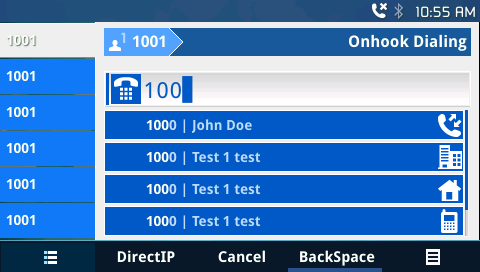
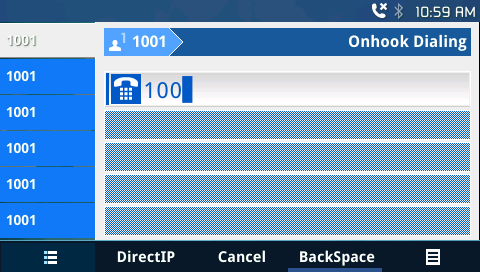
Hide Profile Picture
When the contact picture is not set, the GXP2130/GXP2140/GXP2160/GXP2170/GXP2135 will remove the picture from the LCD screen to leave more space for the number and name displayed.

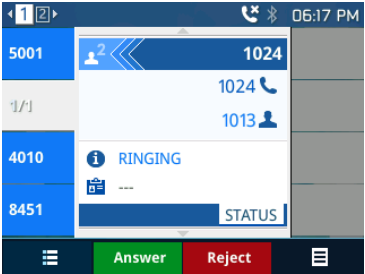
Answering Phone Calls
Receiving Calls
- Single incoming call. Phone rings with selected ring tone. The corresponding LINE key will flash in red. Answer call by taking handset off hook, or using Speaker/Headset, or pressing flashing LINE key;
Note:
- Users can choose when receiving a call to either ring from their headset, ring from both headset and the speaker, or only ring from the speaker. This option can be enabled from the Web GUI under Settings 🡪 Preferences 🡪 Audio Control and set “Always Ring Speaker”.
- Multiple incoming calls. When another call comes in while having an active call, the phone will produce a Call Waiting tone (stutter tone). The other LINE key will flash in red. Answer the incoming call by pressing the flashing LINE key. The current active call will be put on hold automatically.
Note:
- When there is an ongoing call, users can disable incoming call notification pop up. This way users will not get disrupted by unexpected popup call but still get notified by the flashing line LED. This option can be enabled from the Web GUI under Settings 🡪 Call Features. For further information, please refer to the admin guide.
- Ring Group Call. If the phone is member of a Ring Group, when the SIP server receives a call to the Ring Group, all phone will start ringing, once a phone answers the call, a missed call notification will pop up on all phones. The GXP21XX Series support reason header, which allows the phones not to log a missed call if it is answered elsewhere. The following message will be included in the CANCEL SIP message received by the phone for notifying it that another user answers the call.
Reason: SIP; cause=200;text=”Call completed elsewhere”
Call Screen Improvement
If a text contains more than one line, it will slide from right to left to display the full information without being cut, as shown on the figure below.
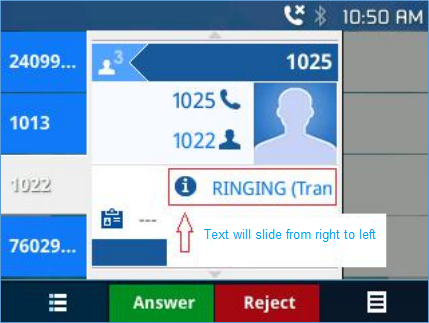
Group Listening
Group Listening will give the users the ability to enable speaker sound while the handset/headset still in use. This option can be enabled from the Web GUI under Settings 🡪 Preferences 🡪 Audio Control. Users can press SpkOn softkey to activate the speaker sound or press SpkOff softkey to disactivate it.
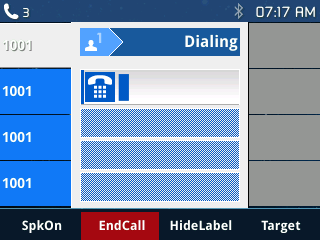
Do Not Disturb
Do Not Disturb can be enabled/disabled from phone’s LCD by following the steps below:
- Press the Menu button and select “Preference” using navigation keys;
- Press Menu button again to get into Preference options;
- When “Do Not Disturb” is highlighted, press Left/Right key to disable/enable DND;
- Press “Save” softkey to save the change
Users could also enabled/disable DND quickly by pressing the Mute button, note also that mute button function can be set also to idle Mute, or be disabled under the web GUI option Settings 🡪 Call features 🡪 Mute Key Function While Idle.
If the contact number belongs to Blacklist group, the call from this number will be blocked. If the contact number belongs to Whitelist group, when the phone is on DND mode, the call from whitelist number will be allowed.
This can be done from the web GUI or under “Phonebook > Contacts” by adding a user into either the “Blacklist” or “whitelist” as shown below.
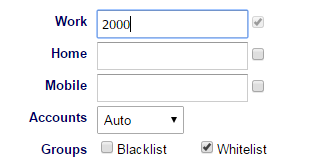
Or users can add a contact to “Blacklist” or “Whitelist” from the phone LCD under “Menu > Contact > Local Phonebook” as shown below.
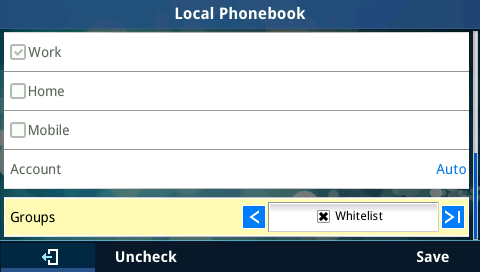
Call Waiting/Call Hold
- Call Waiting: This feature allows users to receive calls while they are already engaged on an ongoing conversation, in such a case the phone will start ringing OR a call waiting tone will be played if enabled from the web GUI under “Call Features” menu. After this the phone will pop up the waiting call and gives the user the choice to either accept or refuse the call, it can be configured from the web GUI 🡪 Account X 🡪 Call Settings 🡪 Call waiting or using the feature codes as mentioned on Call Features table.
- Hold. Place a call on hold by pressing the HOLD button. The active LINE key will blink in green and if configured under web GUI “Account X🡪 Call Settings 🡪 On Hold Reminder Tone”, then a reminder tone will be played to notify the user that he has a call on hold.
- Resume. Resume call by pressing the blinking LINE key.
- Multiple calls. Automatically place active call on hold or switch between calls by pressing the LINE key. Call waiting tone (stutter tone) will be audible on new incoming call during the active call.
- Call hold duration. The phone will show the call hold duration as shown on figure below. The hold duration will be displayed only if there are two calls on hold or more and user can use the up/down arrows to check the hold duration of each call.
Note: Users can see how long their call has been hold if option “Show on Hold Duration” under Web GUI 🡪 Settings 🡪 Call Features is set to YES. Please refer to the admin guide for further detail.
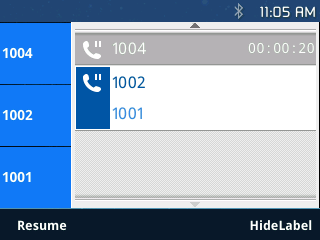
Mute
During an active call, press the MUTE button to mute/unmute the microphone. The LCD will show the Mute icon on the top of screen, when the call is muted.
Call Transfer
GXP2130/GXP2140/GXP2160/GXP2170/GXP2135 supports Blind Transfer and Attended Transfer. This feature can be disabled from the web GUI menu under “Settings 🡪 Call features 🡪 Disable Transfer”.
- Blind Transfer.
- During the first active call, press TRANSFER and dial the number to transfer to;
- Press SEND key or # to complete transfer of active call.
- Attended Transfer.
- When set to “Static”
- During the first active call, press LINE key. The first call will be put on hold;
- Enter the number for the second call in the new line and establish the call;
- Press TRANSFER;
- Press the other LINE key, which is on hold to transfer the call.
- When set to “Dynamic”
- Establish one call first;
- During the call, press TRANSFER. A new line will be brought up and the first call will be automatically placed on hold;
- Dial the number and press SEND or # to make a second call. (Once the number is entered, a “Transfer” soft key will show. If “Transfer” soft key is pressed instead of SEND or #, a blind transfer will be performed);
- Press TRANSFER again. The call will be transferred.
- For Attended Transfer, after dialing out the number for the second call, a “Split” soft key will show. If the second call is not established yet (ringing), pressing “Split” will hang up the second call. If the second call is established (answered), pressing “Split” will resume the second call and keep the first call on hold.
Note:
- To transfer calls across SIP domains, SIP service providers must support transfer across SIP domains.
When choosing “Dynamic”, press Transfer softkey, you will enter this page:
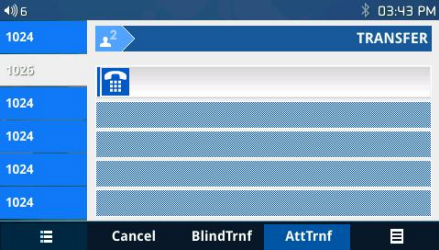

Using the target selection feature, users can realize the following function:
- Add a new softkey “Target” under transfer/conference action page.
- When click on the softkey, it will take user to a target selection page in which user can choose other possible transfer/conference targets (e.g. Local/BS Phonebook, Local/BS Call History, LDAP, Smart VPK List, or connected lines)
- When accessing Local/BS Phonebook and Local/BS Call History page, the softkey will show limited options (e.g. Dial) when phone is under busy state to make it easier for user to perform the dialing task.
- When accessing Smart VPK List, the phone will display the list of the VPK targets which are allowed to be used as the transfer/conference target based on the current account.
- When accessing Line, the phone will list the lines which are available to be used for transfer/conference.
- Under Transfer/Conference screen
A new softkey “Target” is added under transfer/conference action page.
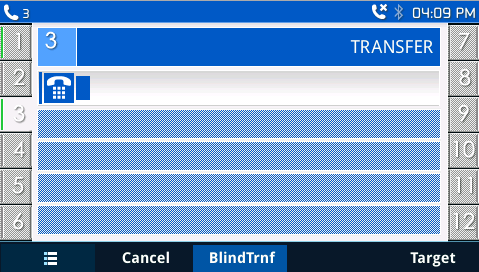

When clicking on the softkey, it will take user to a target selection page in which user can choose other possible transfer/conference targets.
Target selection page provides a list of possible transfer/conference targets.
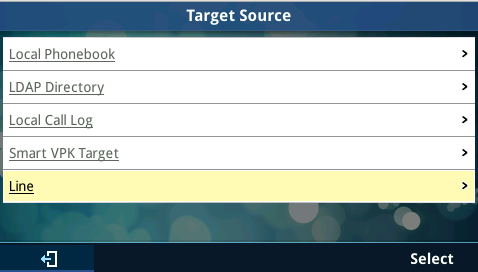
User can use up/down key to select target from list and use menu key or “Select” softkey to choose the target. By selecting Local/Broadsoft Phonebook, Local/Broadsoft Call Log and LDAP Directory,
LCD will display according menu page. Also, in these pages, softkey will show limited options (e.g. Dial) to make it easier for user to perform the dialing task.
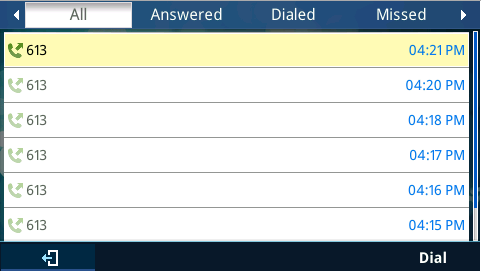
By selecting “Smart VPK Target”, a list of available VPK for transfer/conference will be shown as bellow. User can use up/down key or “select” softkey to choose item to use.
Available VPK contains VPK with mode as below:
- Speed Dial (current account)
- Speed Dial via Active Account (any account)
- BLF or Eventlist BLF (current account)
- Presence (current account)
Specially, for BLF/Eventlist BLF/Presence, an icon with status will be shown on the left side of the item. Icon here contains 3 types based on monitoring state:
- Unknown: Question Mark
- Busy: RED
- Available: GREEN

By selecting “line”, a list of available line for transfer/conference will be shown as bellow. User can use up/down key or “select” softkey to choose item to use.
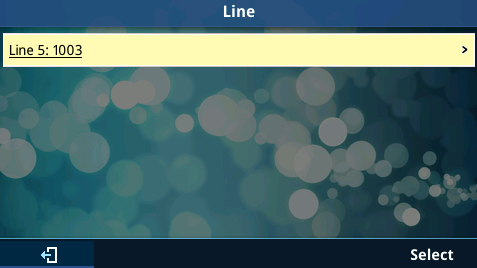
Using the transfer from information, users can see who transferred the call to them. Example shows below:

VPK Paging Support inside Call Screen
Users can use their VPK mode preconfigured with while in call screen. Such as Speed Dial, BLF, dial DTMF…, as shown in the figure below.
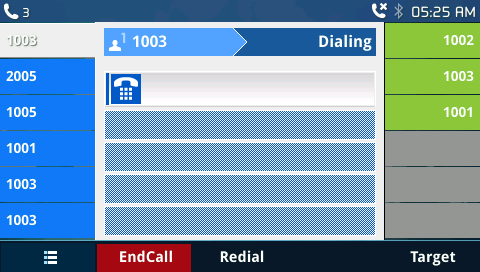
Active VPK Page
If active VPK page is enabled, when monitored BLF number is called, the screen will generate the VPK Page that shows which VPK key(s) is(are) active as below, where you can see the page number is a handset icon, which indicate that this page is an active VPK page. The original VPK pages are still navigable by pressing Next softkey
This option can be found under device web UI 🡪 Settings 🡪 Call Features 🡪 Enable Active VPK Page.

Outbound Notification
The GXP2130/GXP2140/GXP2160/GXP2135/GXP2170 allows users to align the outbound notification with the call log change if the same account is registered in multiple phones.
Line Switching in Call Screen
When having two lines (or more) active users will be able to switch between the calls by pressing up/down, arrow keys, this will allow users to manipulate calls through the phones arrow keys as shown on the figures below:
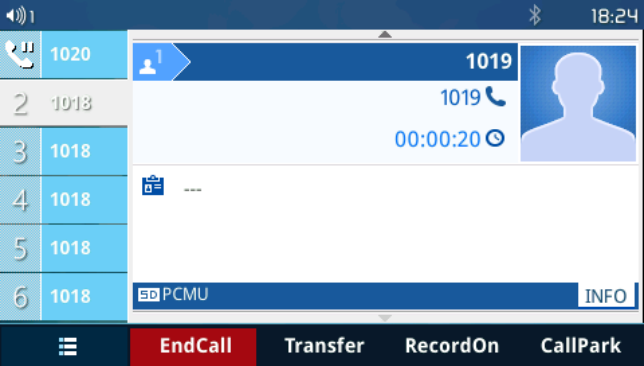
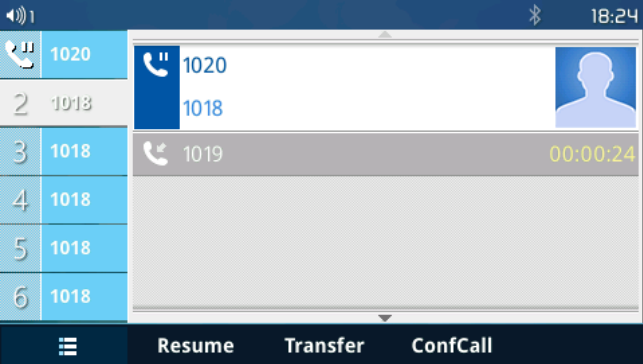
Line Key Mode Support
Allow users to change between Line Mode and Account Mode.
In the “Line Mode”, the amount of VPKs will be the amount of lines you can have, as shown below.

In the “Account Mode” the lines will be grouped by account so the VPKs could hold more lines in one accounts, as shown below.
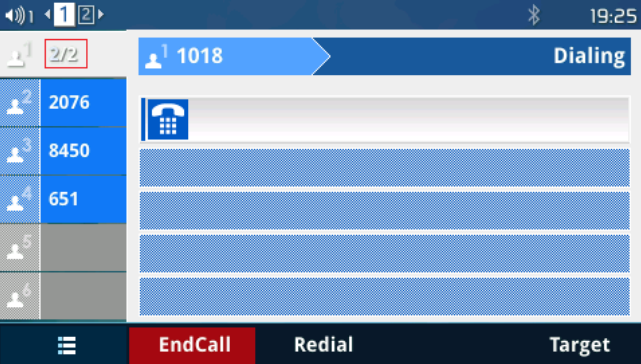
For example, with line mode, when the line is in use, by pressing the VPK, nothing is going to happen. In Account Mode, when the line is in use, by pressing the VPK, a new line will be initiated.
Note:
In “account mode”, the phone adds the “NewCall” softkey and the user is able to make a second call directly using this softkey whether available or on hold.
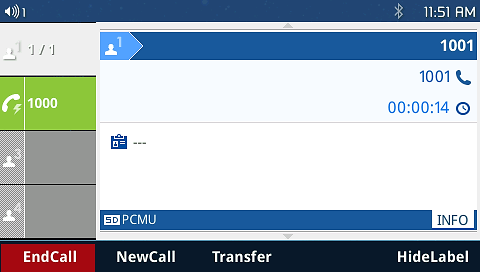
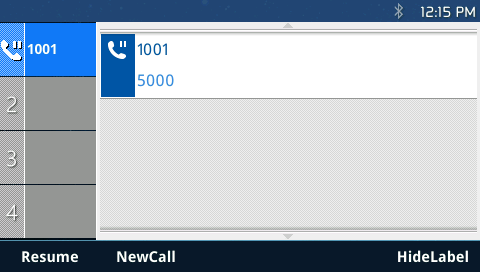
4-Way/ 5-Way Conferencing
GXP2130 can host up to 4-way conference call with other parties (PCMU/PCMA). GXP2140/GXP2160 /GXP2170/GXP2135 can host up to 5-way conference call. Users can disable/enable conference call feature from the web GUI of the phone under menu Settings 🡪 Call features 🡪 Disable Conference.
- Initiate a conference call.
- Establish calls with 2 or more parties respectively;
- While 1 call is active, the other call will be put on hold with its LINE key blinking in green;
- Press CONF key;
- Press the desired LINE key on hold, the conference will be established;
- Repeat the previous 2 steps for all the other parties on hold to join the conference.
- Cancel Conference.
- If after pressing the CONF key, the user decides not to conference, press Cancel softkey or the current active LINE key (LED in solid green);
- This will resume the 2-way conversation with the current line.
- Split and Re-conference.
- During the conference, press HOLD key. The conference call will be split, and the calls will be put on hold separately with the LINE keys blinking in green;
- Select 1 LINE key and press to resume the 2-way conversation;
- If users would like to re-establish conference call, before 1 separate LINE is selected, press the ReConf softkey right after the conference call is held/split;
- End Conference.
- Press HOLD key to split the conference call. The conference call will be ended with both calls on hold; Or
- Users could press the EndCall softkey or simply hang up the call to terminate the conference call.
GXP2130/GXP2140/GXP2160/GXP2170/GXP2135 supports Easy Conference Mode, which can be used combined with the traditional way to establish the conference.
- Initiate a conference call.
- Establish 1 call;
- Press CONF key and a new line will be brought up using the same account;
- Dial the number and press SEND key to establish the second call;
- Press CONF key or press the ConfCall softkey to establish the conference.
- Join more parties in established conference call.
- Establish conference call;
- Press CONF key and a new line will be brought up using the same account;
- Dial the number and press SEND key to establish the second call;
- Press CONF key or press the ConfCall softkey to join the new party in the established conference.
- Split and Re-conference.
- During the conference, press HOLD key. The conference call will be split and both calls will be put on hold separately with 2 LINE keys blinking in green;
- Select 1 LINE key and press to resume the 2-way conversation;
- If users would like to re-establish conference call, before 1 separate LINE is selected, press the ReConf softkey right after the conference call is split.
- Cancel Conference.
- If user decides not to conference after establishing the second call, press EndCall softkey instead of the ConfCall softkey/CONF key;
- This will end the second call and the screen will show the first call on hold.
- End Conference.
- Press HOLD key to split the conference call. The conference call will be ended with both calls on hold; Or
- Users could press the EndCall softkey or simply hang up the call to terminate the conference call.
Notes:
- The party that starts the conference call must remain in the conference for its entire duration, you can put the party on mute, but it must remain in the conversation. In addition, this is not applicable when the feature “Transfer on Conference Hang-up” is turned on.
- The option “Disable Conference” must be set to “No” to establish conference.
Only Same Account in Conference
Now users can limit the ability for the phone to cross conferencing different accounts. This option can be found under device web UI 🡪 Settings 🡪 Call Features. For further information, please refer to admin guide.
Conference Event Indicator (CEI)
- Regular Conference Room
- If CEI is detected, there will be a new tab called “CEI” next to “INFO”. Pressing the “Menu” hard key will switch between the tabs.
- In the CEI tab, conference events will be shown chronologically (as shown below).
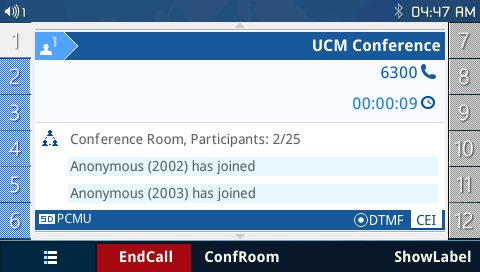
- A “ConfRoom” softkey should also appear to access the list of conference room users (as shown below).
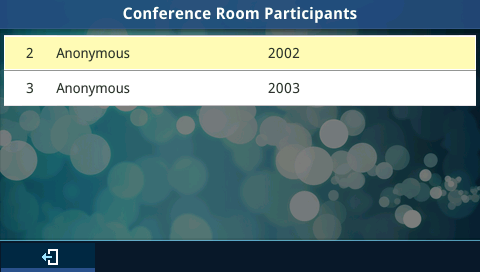
- Conference Room with User Invite Enabled
- If “Enable User Invite” is checked for a conference room, ALL users will have the ability to invite other users or bridge other conference rooms.
- The “ConfRoom” softkey will have a secondary action called “ConfMenu”. Please hold softkey for a few seconds to use. A bottom line under the softkey name will usually indicate if a secondary action is available.
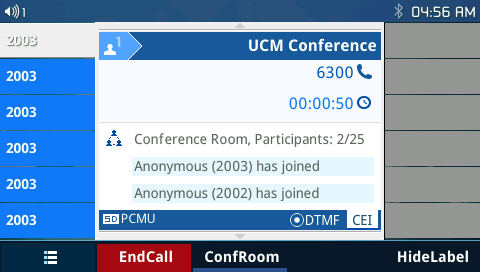
- The “ConfMenu” softkey will also be display in the conference room.
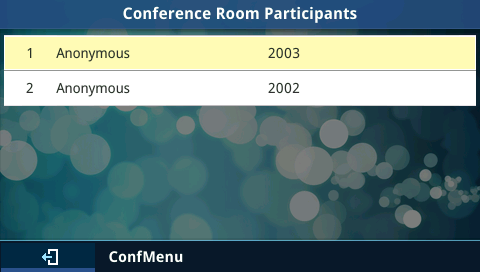
- An example of the conference menu is shown below:
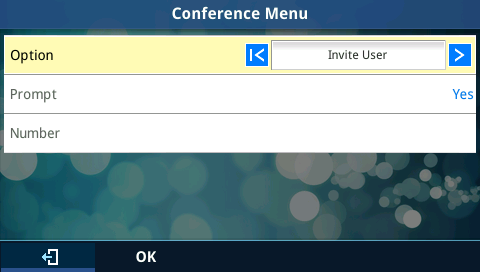
- Conference Room as an Admin
- As an admin in a conference room, the admin may choose to kick and mute/unmute all users that is not another conference room or him/her-self. An admin will also have more options in the conference menu page such as lock/unlock.
- New Display Information
With UCM running firmware version 1.0.13.14 and beyond, new display information besides a user joining and leaving a conference room can now be displayed.
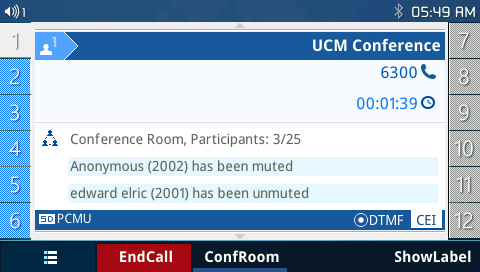
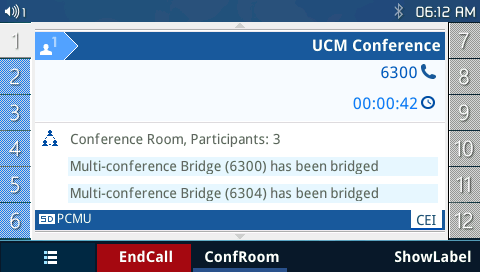
- Conference Unbridge
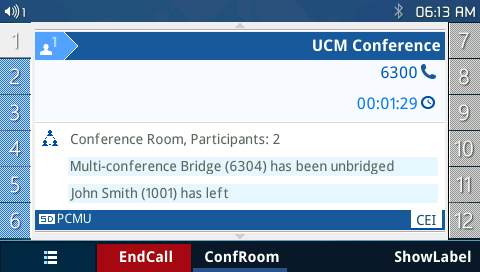
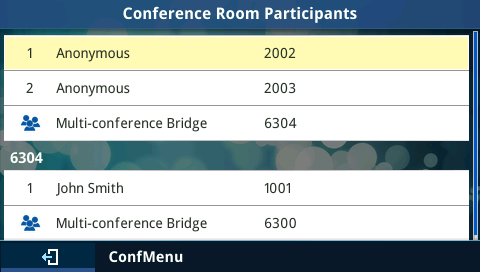
Voice Messages (Message Waiting Indicator)
A blinking red MWI (Message Waiting Indicator) on the top right corner of the phone indicates a message is waiting. Meanwhile, a message box symbol will show in the front of the specific account. Dial into the voicemail box to retrieve the message by entering the voice mail number of the server or pressing the Voicemail button (Voice Mail User ID must be properly configured as the voice mail number under Web GUI🡪Account X🡪General Settings. An IVR will prompt the user through the process of message retrieval.
Virtual Voice Mail
Functionality
With this feature, phone downloads the voicemail into a .wav file and stores it on the phone for the user. Users don’t have to dial feature codes and go to the BroadSoft server to listen to their voice mails. Also, users can pause/resume their voicemail message at any time they want.
Note: Currently this feature works with Broadsoft server.
Shared Call Appearance (SCA)
The GXP2130/GXP2140/GXP2160/GXP2170/GXP2135 phone supports shared call appearance by Broadsoft standard. This feature allows members of the SCA group to shared SIP lines and provides status monitoring (idle, active, progressing, hold) of the shared line. When there is, an incoming call designated for the SCA group, all the members of the group will be notified of an incoming call and will be able to answer the call from the phone with the SCA extension registered.
All the users that belong to the same SCA group will be notified by visual indicator when a user seizes the line and places an outgoing call, and all the users of this group will not be able to seize the line until the line goes back to an idle state or when the call is placed on hold (except for when multiple call appearances are enabled on the server side).
In the middle of the conversation, there are two types of hold: Public Hold and Private Hold. When a member of the group places the call on public hold, the other users of the SCA group will be notified of this by the red-flashing button and they will be able to resume the call from their phone by pressing the line button. However, if this call is placed on private-hold, no other member of the SCA group will be able to resume that call.
To enable shared call appearance, the user would need to register the shared line account on the phone. In addition, they would need to navigate to “Settings”🡪”Programmable Keys” on the web UI and set the line key mode as “Shared Line”. If the user requires more shared call appearances, the user can configure multiple line buttons to be “shared line” buttons associated with the account.
Call Forwarding Rules Enhancement
- Users can access their call forwarding from the phone without erasing the configured numbers. On the phone, you can access through “Menu🡪phone🡪Call Features🡪Account X” When disabled the LCD screen will look like the following figure.

When the feature is enabled, the phone’s LCD screen will show the following figure.
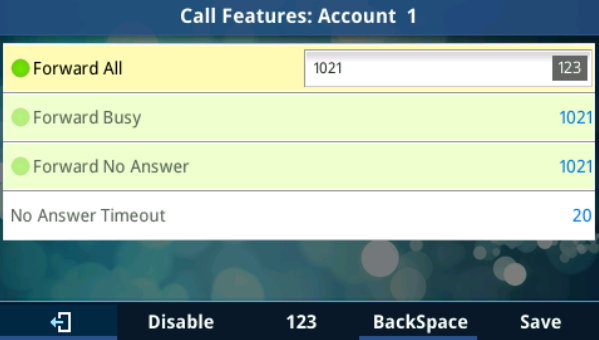
- When forwarding a call, the recipient will display a “diverted from” message if the option “Enable diversion information display” is set to “Yes” which can be found under web GUI 🡪 Settings 🡪 Call Features. If user selects No, when phone receives a forwarded call, phone will not display the “diverted from” message. “Diverted From” message:
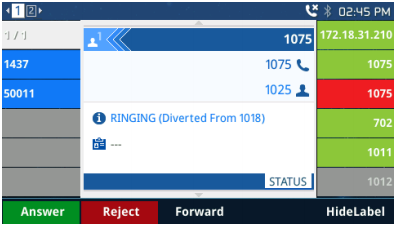
- A Call Forward using BLF can also be Performed by pressing the BLF key set on VPK or MPK as forward destination. You only need to Subscribe to a valid BLF and press Forward Key then the BLF key to perform the call forward.
Missed Calls Indication
When users miss a call, the GXP2130/GXP2140/GXP2160/GXP2170/GXP2135 will show the notification on the LCD screen as shown below.
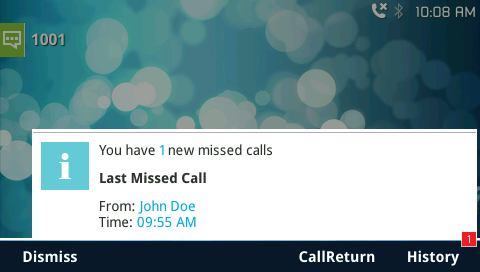
Note: Users can set the phone to turn off LCD backlight while having a missed call. This option can be found under device web UI 🡪 Settings 🡪 Preferences 🡪 LCD Display 🡪 disable missed call backlight. If users want to have missed call notification, select yes, bug flash MWI LED so when missed call exist, MWI will not be deemed.
Dial Plan
The GXP2130/GXP2140/GXP2160/GXP2170/GXP2135 supports alphanumeric characters in dial plan. Two cases can be set to handle alphanumeric characters in the dial plan.
- Capital X can be used to represent digits from 0-9, and letters a-z / A-Z.
For instance, if the following pattern is set on the dial plan {X123}, this mean that any string that start with a letter/digit followed by 123 will pass the dial plan check (F123, a123, 5123,).
- “\” character can be used to indicate a specific letter.
For instance, if users want to allow only one alphanumeric character, the dial plan should be like follow:
{\t\e\s\t}, when users dial “test” it will pass the dial plan check.
Screenshots
Users can take screenshots of the GXP2130/GXP2140/GXP2160/GXP2170/GXP2135 phones, by holding key HOLD and then pressing MENU key, the output will be shown on the phone webGUI under “Status 🡪 System Info” as shown in the figure below.
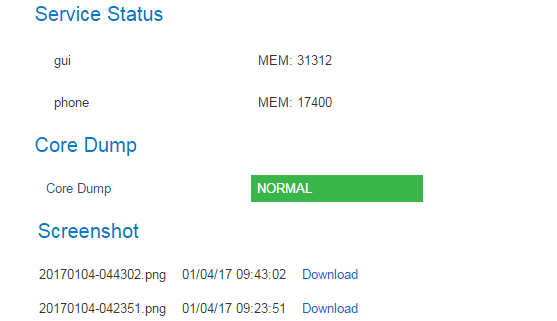
Users need to click on “Download” to view the screenshot
Call Features
The GXP2130/GXP2140/GXP2160/GXP2170/GXP2135 supports traditional and advanced telephony features including caller ID, caller ID with caller Name, call forward etc.
*30 | Block Caller ID (for all subsequent calls)
|
*31 | Send Caller ID (for all subsequent calls)
|
*50 | Disable Call Waiting
|
*51 | Enable Call Waiting
|
*67 | Call with Caller ID Blocked (per call)
|
*82 | Call with Caller ID Enabled (per call)
|
*70 | Call with Call Waiting Disable (per call)
|
*71 | Call with Call Waiting Enabled (per call)
|
*72 | Unconditional Call Forward. To set up unconditional call forward:
|
*73 | Cancel Unconditional Call Forward. To cancel the unconditional call forward:
|
*90 | Busy Call Forward. To set up busy call forward:
|
*91 | Cancel Busy Call Forward. To cancel the busy call forward:
|
*92 | Delayed Call Forward. To set up delayed call forward:
|
*93 | Cancel Delayed Call Forward. To cancel the delayed call forward:
|
Changing Default Password on First Boot
When accessing the GXP2130/2140/2160/2170/2135 for the first time or after factory reset, users will be asked to change the default administrator password before accessing GXP21xx Web interface. The new password field is case sensitive with a maximum length of 25 characters. Using strong password including letters, digits and special characters is recommended for better security.
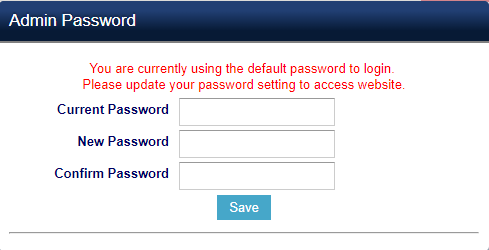
Diagnosis
Users could access factory functions menu in order to diagnosis the phone’s hardware/software. To do so please access to LDC menu under “System🡪Factory Functions” or use the shortcut by pressing at the same time the Hold Key and the Up-arrow key.
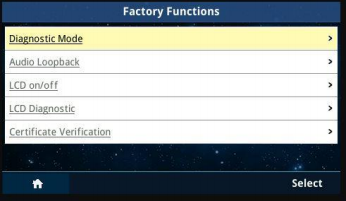
These tools can be used to check the hardware and software status of the phone like verifying the LED, keypad buttons, LCD and certificates verification …etc.
Instant Messages
The GXP2130/2140/2160/2170/2135 allows users to send instant messages not only through the phone but also from the Web GUI, this can be done by clicking
on the top left of the web GUI, the following figure will show up to send messages to the specified number.
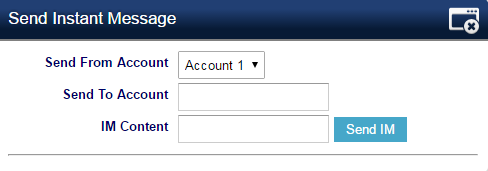
Note: Users can choose either to get popup window on their LCD or not when receiving an instant message by enabling/disabling the “ENABLE IM POPUP” option from the Web-UI🡪Settings🡪Call Features🡪Enable IM Popup.
Configuring Eventlist BLF
Grandstream GXP2130/2140/2160/2170/2135 Enterprise IP Phones support both Grandstream UCM Busy Lamp Filed and Event List BLF features and allows end users, such as attendant, to monitor the call status of users in the list. GXP2130/2140/2160/2170/2135 supports this feature by sending out the subscription request to the UCM and changing the indicator status of the Line keys, MPKs, or virtual MPKs that associated with the monitored users.
Additionally, the phone is also able to display the original caller’s call ID and to pick up the calls to the monitored extensions by using a pre-defined feature code called BLF- Call-pickup Prefix.
For more details on Eventlist BLF configuration guide, please refer to:
https://documentation.grandstream.com/knowledge-base/how-to-configure-eventlist-blf/
CONNECTING TO DEVICES
The GXP2130/GXP2140/GXP2160/GXP2170/GXP2135 supports EHS headset (Plantronics). GXP2140/2160 /GXP2170 is also capable to connect to USB and Bluetooth devices.
EHS Headset
The GXP2130/GXP2140/GXP2160/GXP2170/GXP2135 supports normal RJ11 headset and Plantronics EHS headset. To use Plantronics EHS headset, go to the GXP2130/GXP2140/GXP2160/GXP2170/GXP2135 web GUI🡪Settings🡪Audio Control: Headset Type. Select “Plantronics EHS” and reboot the phone to take effect.
- Connect EHS Headset (Plantronics) to GXP2130/GXP2140/GXP2160/GXP2170/GXP2135. Insert headset connector into the RJ11 headset port on the back of GXP2130/GXP2140/GXP2160/GXP2170/GXP2135.
-
To use headset mode, press headset button on the GXP2130 / GXP2140 / GXP2160 / GXP2170/GXP2135. A headset icon
will show on the GXP2130 / GXP2140 / GXP2160 / GXP2170 / GXP2135 status bar.
Bluetooth
Bluetooth is a proprietary, open wireless technology standard for exchanging data over short distances from fixed and mobile devices, creating personal area networks with high levels of security. GXP2130v2/GXP2140/GXP2160/GXP2170/GXP2135 supports Bluetooth. On GXP2130v2/GXP2140/GXP2160/GXP2170/GXP2135, users could connect to cellphones (supporting Bluetooth) via hands free mode or use Bluetooth headset for making calls.
To connect to a Bluetooth device, turn on GXP2130v2/GXP2140/GXP2160/GXP2170/GXP2135’s Bluetooth radio first. The first time when using a new Bluetooth device with the GXP2130v2/GXP2140/GXP2160/GXP2170/GXP2135, “pair” the device with the phone so that both devices know how to connect securely to each other. After that, users could simply connect to a paired device. Turn off Bluetooth if it is not used.
Bluetooth related settings are under GXP2130v2/GXP2140/GXP2160/GXP2170/GXP2135’s LCD Menu🡪System🡪Bluetooth.
Two ways of pairing a device to the GXP2130v2/GXP2140/GXP2160/GXP2170/GXP2135exists.
- If the phone sends out the pairing PIN, the user will need to enter this code using the keypad on the phone.
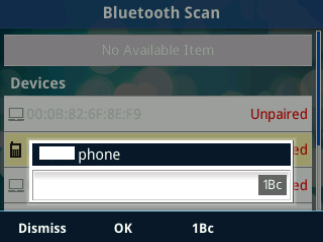
- If the phone generated the pairing PIN, it will be displayed on the LCD, the users need to input this PIN on the Bluetooth device to finish paring.
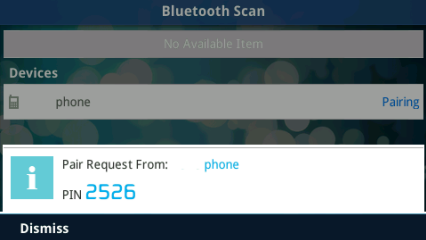
GXP2130v1 does not support Bluetooth, only GXP2130v2 supports Bluetooth on the phone, you could differentiate by P/N as well as by FCC ID.
For more details on Bluetooth features, please refer to:
https://documentation.grandstream.com/knowledge-base/how-to-use-bluetooth-functionality/
USB Connection (GXP2140/GXP2160/GXP2170 Only)
GXP2140/GXP2160/GXP2170 is capable to connect to USB drive for importing wallpaper file and saving packets capture files. The basic and advance features about wallpaper application and packets capture are described in “GXP2130/GXP2140/GXP2160/GXP2170/GXP2135 Administration Guide”.
Starting from firmware version 1.0.11.35 the following GXP phone models GXP2140/GXP2160/GXP2170 added USB headset support. For more details, please refer to our official Headset Compatibility list Guide here: https://www.grandstream.com/sites/default/files/Resources/gxp21xx_17xx_headsetcompatibility.pdf
Please visit https://www.grandstream.com/support to download the latest GXP2130 / GXP2140 / GXP2160 / GXP2170/GXP2135 Administration Guide”.
CONNECTING GXP21XX TO GDS3710 DOOR SYSTEM
The GXP21xx offers a powerful integration with GDS3710 Door System and allows users to remotely open the door, initiate call to the GDS3710 and get real time audio/video stream.
The GXP21xx can be connected with the GDS3710 in two different ways, either using peering mode (without a SIP server) or through a SIP server.
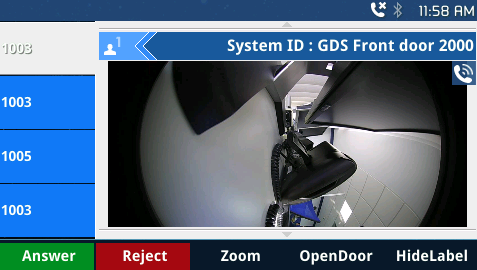
For more details, refer to:
https://documentation.grandstream.com/knowledge-base/connecting-gds37xx-with-gxp-phones/
RESTORE FACTORY DEFAULT SETTINGS
There are two methods to perform factory reset on GXP21XX IP phone series which are described below.
Restore to factory using hard keys
In order to perform hard reset of the phone using keypad buttons please follow below steps:
- Power cycle the phone.
- Wait till you see “booting”.
- When phone is “booting”, press KEY 1 + Key 9 immediately and hold it until LCD factory reset message or if a password is required.
- If it is required, enter the correct admin password to factory reset.
- Factory reset is complete.

Restore to factory using LCD menu
Please follow the instructions below to reset the phone:
- Press MENU button to bring up the keypad configuration menu.
- Select “System” and enter.
- Select “Operations – Factory Reset”.
- A warning window will pop out to make sure a reset is requested and confirmed.
- Press the “Yes” Softkey to confirm and the phone will reboot. To cancel the Reset, press “No” Softkey instead.
CHANGE LOG
This section documents significant changes from previous versions of user manuals for GXP2130/GXP2140/GXP2160/GXP2170/GXP2135. Only major new features or major document updates are listed here. Minor updates for corrections or editing are not documented here.
Firmware version 1.0.11.85
- No major changes.
Firmware version 1.0.11.84
- Disabled User Web Access by default. [Configuration via Web Browser]
Firmware version 1.0.11.79
- Added Support to display or hide clock and weather widget on LCD. [Date and time]
- Added Support of GDS open door button in idle state. [GDS OPENDOOR]
Firmware version 1.0.11.74
- No Major changes.
Firmware version 1.0.11.71
- Added Support to show “Description” for Voicemail VPK. [voicemail vpk]
Firmware version 1.0.11.64
- Removed Weather service.
Firmware version 1.0.11.57
- No major changes.
Firmware version 1.0.11.56
- Added Support to configure two passwords for the same GDS “System Number” and display both“Open Door “softkey on the device LCD. [Connecting GXP21xx with GDS]
Firmware version 1.0.11.48
- No major changes
- No major changes
- Added USB headset support for GXP2140/GXP2160/GXP2170. [USB Connection (GXP2140/GXP2160/GXP2170 Only)]
- Added Support to display the string entered in “System Identification” field when communicating with GDS. [CONNECTING GXP21XX TO GDS3710 DOOR SYSTEM]
- No major changes
- No major changes.
- No major changes.
- No major changes.
- Added Support to accept Pvalue in string format for MPKs, Extension board and softkey mode configuration [Mode String]
- Added Support for Ukrainian language. [GXP2130/GXP2140/GXP2160/GXP2170/GXP2135 Technical Specifications]
- No major changes.
- No major changes.
- Added Ability to press BLF key as forward destination [Call Forwarding Rules Enhancement]
- Added support to disable/enable ringtone on headset [Receiving Calls]
- Added support to show both call session timer and hold duration timer on LCD during call hold [Call Waiting/Call Hold]
- Added support to set only the same account in conference [Only Same Account in Conference]
- Added support to turn off LCD even if there is a missed call notification and flash MWI LED [Missed Calls Indication]
- Added support to park call real number [Virtual Multi-Purpose Keys]
- Added option to disable incoming call popup [Receiving Calls]
- Added support of exact match lookup method for LDAP search [Exact Match Search in LDAP]
- Added support to display or hide Diversion info [forwarding a call]
- Removed subscription then changing subscribe information [Virtual Multi-Purpose Keys]
- No major changes.
- Updated Korean LCD and web UI display translations. [Korean]
- Added more character for password input from LCD
- Added support for Group Listening softkey [Group Listening]
- Added FTP support for provisioning and firmware upgrade [FTP/FTPS]
- Added Catalan Language support [GXP2130/GXP2140/GXP2160/GXP2170/GXP2135 Technical Specifications]
- Added option to enable/disable instant messages on LCD screen [Enable IM Popup]
- Added support to see how long a call has been on hold from the phone LCD [Call hold duration]
- Supported Mute function during dialing outgoing call phase [mute the call at dialing]
- Added login window to access Broadsoft XSI directory if set as login credential when credential is empty, or login failed [Broadsoft Login Window]
- No major changes.
- No major changes.
- Added support for Password change upon initial login [Changing Default Password on First Boot]
- Added test strength of admin/user password [Test Password Strength]
- Added Authentication section in LCD menu [Authentication]
- Added confirmation for factory reset from the Keypad while booting [Confirmation for Factory Reset]
- Added support of display of Active VPK page [Active VPK Page]
- No major changes.
- No major changes.
- Added support for hard keys reset [Restore to factory using hard keys]
- Added Shortcut HOLD+UP to factory functions page [Diagnosis]
- Added exact search mode for contacts lookup in phonebook [Search a String with Exact Matching mode]
- Added virtual voicemail feature for BroadSoft [Virtual Voice Mail]
- Added support for error message popup [Error Message Indicator]
- Added ability to display original caller’s ID for BLF call pick up calls. If user performs a BLF pickup, the phone will display the original caller’s call ID instead of the extension’s call ID [BLF- Call-pickup]
- Added “NewCall” softkey when on hold in Account Mode so that users do not need go back to the call to access NewCall softkey [“NewCall” softkey]
- No major changes
- No major changes
- Added ability to search a string in any position using Quick search [Search a String using Quick Search]
- Added Date in the top panel on the phone LCD Screen [Date and Time]
- Added option to sort Broadsoft phonebook by Last/First Name [Sort Broadsoft Phonebook by Last/First Name]
- Added show GDS Open Door softkey as long as remote number matches [CONNECTING GXP21XX TO GDS3710 DOOR SYSTEM]
- No major changes
- Added support for disabling predictive dial feature [Predictive Dialing]
- Added support for missing call indication popup window [Missed Calls Indication]
- Added the ability to hide picture icon on all screen if not set [Hide Profile Picture]
- Added softkey to show/hide VPK label in call screen [Show/Hide Label Support]
- Improved the layout for smaller LCD phones’ call screen [Call Screen Improvement]
- Improved attended transfer feature [Call Transfer]
- Added VPK paging support inside call screen [VPK Paging Support inside Call Screen]
- Added support for Up/Down line switching when call screen is under active/overview state [Line Switching in Call Screen]
- Added transfer destination should display who the call was referred by [Call Transfer]
- Enhance Instant Message List page display to match the rest of the menu pages [Instant Messages]
- Added LINE key mode support, coexisted with legacy mode [Line Key Mode Support]
- Added Attended Transfer softkey (AttTrnf) when Blind Transfer is processed [Call Transfer]
- Added ability to take screenshots from the phone [Screenshots]
- Added DND Authorized Number (Whitelist) & Blacklist and other enhancement [Do Not Disturb]
- Improve Bluetooth handsfree device connecting process [Bluetooth]
- Added ability to filter characters from dialed numbers [Filter Characters from Dialed Numbers]
- Added ability to enable/disable local call forwarding rules without erasing configured numbers [Call Forwarding Rules Enhancement]
- Added support for more keys (* and #) as send key. [Completing Calls]
- Added ability to choose the dialing account to dial a contact from local phonebook. [Completing Calls]
- Added ability to use MPK to trigger a conference [Virtual Multi-Purpose Keys].
- Added ability to display mobile and home numbers when searching in local phonebook.
- Added option to enable Plantronics EHS headset ringtone [EHS Headset].
- Added target softkey for dialing status [Call Transfer].
- Added target selection for transfer and conference in call screen [Call Transfer].
- Added Transfer destination should display who the call was referred by.
- Added support to accept P-value in string format for VPK mode configuration xml [P-Value for VPK Mode in String Format].
- Added predictive dialing using call history entries [Predictive Dialing from Call History].
- Added more numbers per contact and “Company”” Title”” Job” Field on the Phonebook [Multiple Numbers and Other Info for One Contact in Phonebook].
- Added Capability to allow DIAL softkey to dial the selected predictive dialing number under dialing state.
- Added pre-Dialing search to include Broadsoft directories [Predictive Dialing Search including Broadsoft Directories].
- Added search feature on Broadsoft directories [Exact Match Search in LDAP].
- Added support to stop Screensaver when VPK is active.
- Improve Auto-provision for Vonage server.
- Change default Dial Plan to { x+ | \+x+ | *x+ | *xx*x+ }.
- Added Conference CEI to support UCM conference change.
- Added support to display status detail on LCD screen when Ethernet not connected, account not register or configured.
- Added support for Virtual Multi-Purpose Keys.
- Changed the default provisioning protocol to HTTPS.
- Added support for iLBC and G723.
- Added support to show programmable keys status on web UI.
- Added Blind and Attended Transfer softkey options.
- For GXP2135 only.
- For GXP2170 only.
- Added GXP2130.
- This is the initial version for GXP2140/GXP2160.




























































